
- Countries & Regions
- International Organisations (IOs)
- Climate Change
- Counter Terrorism
- Disarmament
- Cybersecurity
- International Peacekeeping
- Singapore's Voluntary National Review
- Small States
- Sustainable Development
- Pedra Branca
- Singapore Universal Periodic Review
- Water Agreements
- Find A Singapore Overseas Mission
- Foreign Representatives To Singapore
- COVID-19 Information
- Travel Tips
- Visa Information
- I Need Help Overseas
- Passport Matters
- Legalisation of Documents
- Travel Advisories and Notices
- Useful links
- Press Statements, Transcripts & Photos
- Announcements and Highlights
- Experience Singapore
- Foreign Service Officer (Functional and Corporate)
- Foreign Service Officer (Political and Economic)
- Foreign Service Administration Specialist
- Job Opportunities
- Pre-University
- Undergraduate
- Foreign Service Scholarships
- Recruitment
- Scholarship
- Reach.gov.sg
Expand All | Collapse All
Ministry of Health (MOH) Public Health Advisory
Travellers should refer to the ICA website for the latest information on travelling to/from or transiting through Singapore. For the latest updates on Singapore’s COVID-19 situation, please refer to the MOH website at https://www.moh.gov.sg/covid-19 .
COVID-19 Travel Restrictions
In view of the COVID-19 situation, travellers visiting Germany should be prepared for updates to entry requirements. Please visit the following links for the latest information.
German Federal Foreign Office - Information on entry restrictions, testing, and quarantine regulations in Germany
https://www.auswaertiges-amt.de/en/einreiseundaufenthalt/coronavirus
German Federal Ministry of the Interior, Building and Community – Frequently asked questions related to travel restrictions/border control measures
https://www.bmi.bund.de/SharedDocs/faqs/EN/topics/civil-protection/coronavirus/travel-restrictions-border-control/travel-restriction-border-control-list.html
German Federal Ministry of Health – Current information for travellers
https://www.bundesgesundheitsministerium.de/en/coronavirus/current-information-for-travellers.html
German Federal Ministry of Health – FAQs on proof for entry into Germany https://www.bundesgesundheitsministerium.de/en/coronavirus/infos-reisende/faq-tests-einreisende.html
German Embassy in Singapore – Information on entry into Germany, and quarantine regulations
https://singapur.diplo.de/sg-en

Entry and Exit
Singaporeans do not require a visa for visits less than 90 days within a period of six months. For stays longer than 90 days, you are required to apply for specific visas (i.e. with listed purposes such as for study, work, or family reunion), which have a maximum validity of 90 days, prior to travel to Germany. After arriving in Germany, this visa has to be converted into a long-term resident permit based on the total requested length of stay. The conversion can be done at the local Office for Foreigners (sometimes referred as “Aliens’ Office”). Please note that resident permit will not be granted to applicants who enter Germany using the 90-day visa free privilege (i.e. without applying for a specific visa at the German Embassy in their home countries prior to travel) and seek to extend their stay in Germany thereafter. The Office for Foreigners or “Aliens’ Office” will also not grant an extension of the resident permit if the original purpose for the application of the resident permit in Germany has changed. In this case, the applicant has to leave Germany to obtain a new specific visa in his or her home country, and re-apply for a new resident permit when they travel again to Germany thereafter.
As immigration requirements can change at short notice, travellers are advised to contact their travel agent or the Embassy of Germany in Singapore for the latest information.
Safety and Security
Singaporeans are advised to exercise normal travel precautions and vigilance in crowded areas.
Germany has strict laws governing the following:
- Insult of government officials.
- Bringing into, or taking out of, Germany any literature, music, or paraphernalia that glorifies fascism, the “Nazi past”, or the “Third Reich”.
- Use of the Nazi salute in Germany.
- Breach of domestic peace such as trespassing, disturbance of peace in private properties.
- Driving under the influence of alcohol.
Additional Information
Notice: Closure of Honorary Consulate-General of the Republic of Singapore in Stuttgart, Germany
The Honorary Consulate-General of the Republic of Singapore in Stuttgart, Germany is closed until further notice. For consular assistance, please contact the Embassy of the Republic of Singapore in Berlin or the Honorary Consulate of the Republic of Singapore in Munich, Germany. The contact details are:
Embassy of the Republic of Singapore in Berlin
Voßstraße 17, 10117 Berlin, Federal Republic of Germany
Tel: +49 (30) 2263 430
Emergency Tel (after office hours): +49 152 2341 2182
Email: [email protected]
Honorary Consulate-General of the Republic of Singapore in Munich, Germany
Maximilianstraße 32, 80539 Munich, Federal Republic of Germany
Tel: +49 (89) 58801 0380
Email: [email protected]
General Travel Advice
Overseas Travel – Be Informed & Be Safe [Updated on 5 February 2024]
Singaporeans planning overseas travel are reminded to take the necessary precautions, including being prepared to deal with accidents, natural disasters or terrorist attacks. Singaporeans are also reminded to be familiar with your destination’s local laws, customs, and COVID-19 regulations.
Demonstrations do occur in major cities across the world. Such demonstrations can sometimes escalate into violence. It is important for Singaporeans to keep abreast of local news, avoid any protests or demonstrations and heed the advice of the local authorities.
When participating in outdoor leisure activities overseas, Singaporeans should be mindful that certain sporting activities, especially in open seas, may carry risks. Besides ensuring that one has the physical competencies and appropriate condition to undertake the activity, every effort should be made to ascertain if the trip organiser or guide is reliable and competent, and that appropriate safety and contingency plans are in place. When in doubt, Singaporeans should consult the relevant professional bodies or sporting associations for specific advice.
For those planning to travel, here are some tips:
Before travelling
- Familiarise yourself with our network of overseas missions.
- Purchase comprehensive travel insurance and be familiar with the terms and coverage.
- Equip yourself with research about your destination’s entry requirements, current situation, local laws and customs.
- eRegister with us on our website ( www.mfa.gov.sg ) so that we may reach out to you during an emergency.
While travelling
- Always take care of your personal safety, remain vigilant and monitor local weather news, advisories, and security developments.
- Exercise caution around large gatherings and avoid locations known for demonstrations or disturbances.
- Be prepared for possible delays and last-minute changes in travel plans especially during unforeseen events such as natural disasters, social unrest or terror attacks.
- Stay connected with your friends and family. Inform them of your whereabouts and provide them with your overseas contact details.
- In the event that you require consular assistance, please contact the nearest Singapore Overseas Mission or call the Ministry of Foreign Affairs Duty Office at +65 6379 8800/+65 6379 8855.
Advisory: Email Scams
There have been reports of individuals receiving scam emails/messages purportedly sent from friends in distress overseas. These emails/messages typically originate from an email address/social media known to the receiver bearing claims of the sender getting into trouble overseas and urgently requesting financial assistance. The sender would also claim to have approached a Singapore Embassy/Consulate and the local Police for help to no avail.
MFA takes the safety of all Singaporeans very seriously. Singaporeans in distress approaching our Overseas Missions for assistance will be rendered with all necessary consular assistance. If you receive such emails/messages from purported friends seeking funds transfers, we strongly advise you to call them first to verify the authenticity of the emails/messages before responding to their request. It is also not advisable to give out any personal information such as NRIC/passport numbers, address, telephone number, etc. Any form of reply, even one of non-interest, could result in more unsolicited emails. Members of the public who suspect that they have fallen prey to such scams should report the matter to the Police immediately. Should Singaporeans abroad require consular assistance, they can contact the nearest Singapore Overseas Mission or call the Ministry of Foreign Affairs 24-hr Duty Office at +65 6379 8800/+65 6379 8855.
The Ministry of Foreign Affairs is a ministry of the Government of Singapore responsible for conducting and managing diplomatic relations between Singapore and other countries and regions.
Travel Page
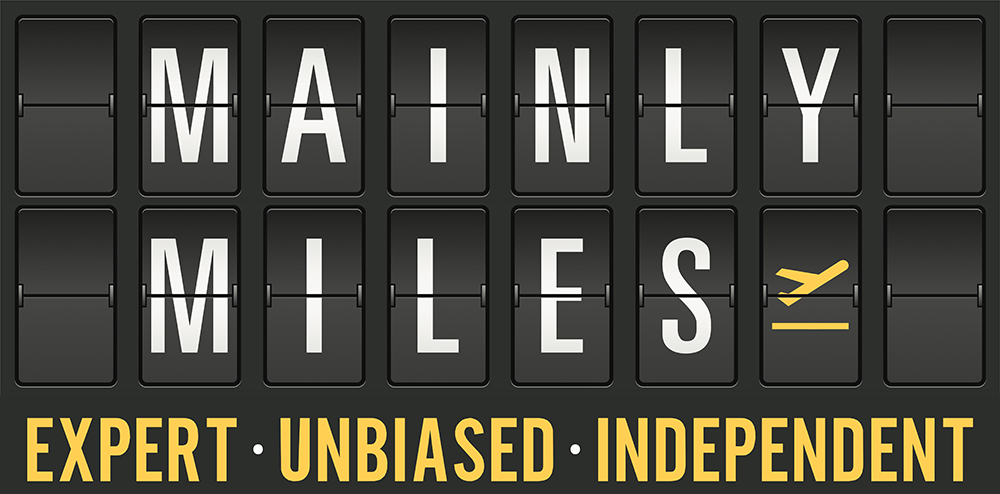
Mainly Miles
Maximise your miles.
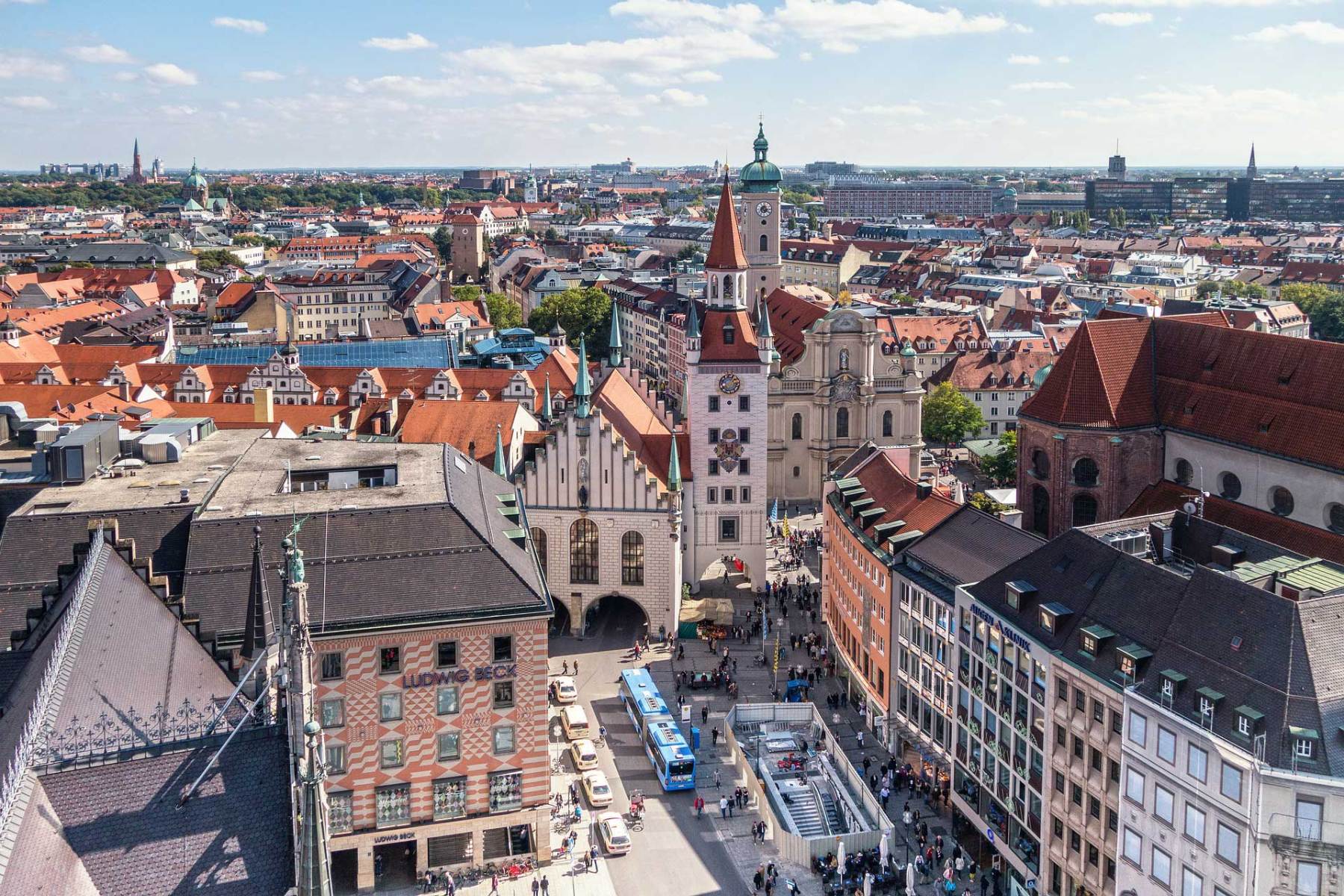
Complete guide to the Singapore – Germany Vaccinated Travel Lane
Latest Updates
- 5th October The first 24-hour clinic option for post-arrival VTL tests is now available – Raffles Medical at Changi Airport T3
- 4th October Travel history over the last 14 days will dictate VTL eligibility, down from 21 days, for arrivals in Singapore from 7th October.
- 28th August Lufthansa VTL services commence on 16th September 2021 . First Class will not be available until at least November 2021.
- 25th August 36 designated clinics for post-arrival (Day 3 and Day 7) tests have been announced Singapore Airlines is now offering Book The Cook on its VTL flights from Frankfurt to Singapore
- 23rd August Singapore Airlines is now offering First Class on its VTL flights from Frankfurt to Singapore
As Singapore moves into ‘endemic COVID’ phase, with around 80% full vaccination among its 5.7 million resident population, a gradual relaxation of border restrictions is finally starting to take effect, leading to the announcement of the first Vaccinated Travel Lanes (VTLs).
This pilot programme will allow testing to replace quarantine / Stay-Home Notice (SHN) periods on arrival in Singapore for those visiting as tourists or for residents returning from an overseas trip.
Germany and Brunei made the initial list, effective from 8th September 2021, and there are no prizes for guessing which of the two most of our readers are eyeing for a trip!
Here’s our detailed rundown of the process for vaccinated travellers heading to and from Germany from next month.
Eligibility
- What about children?
Can you travel to other countries?
Vtl designated flights, which aircraft, first class.
- Lufthansa’s ‘Sleeper Row’
Other seat types
Award rates, the vtl process, your vtl departure checklist, singapore pass holders and visitors, testing costs & clinics, pre-departure test timing, what if you test positive, what if the vtl is suspended, consider the ‘category 2’ lane, other resources, singapore – germany vtl.
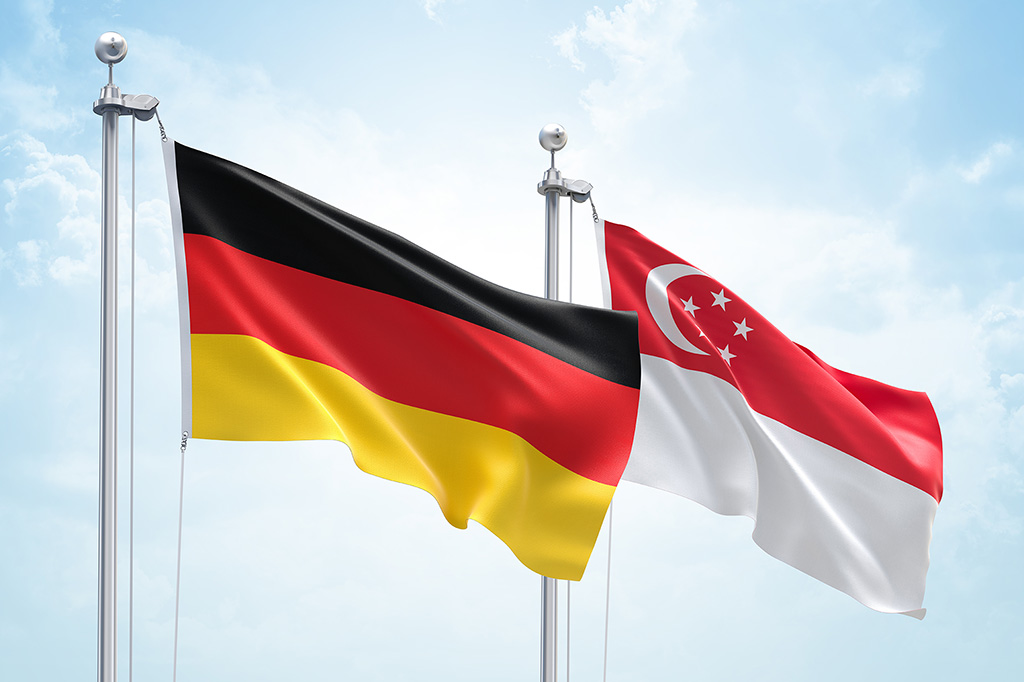
Key Features
- Must have stayed in Germany and/or Singapore for 14 days
- Travel from Germany to Singapore on designated ‘VTL flights’
- No restrictions on travel purpose or itineraries
- Must be fully vaccinated in Singapore or Germany
- Children under 12 are not eligible
- Visitors and Singapore pass holders must apply for a VTP in advance
- COVID-19 PCR testing replaces quarantine / Stay-Home Notice in Singapore
To be eligible to travel from Germany to Singapore via the VTL from 8th September 2021, you must fulfil the following criteria:
- Have no travel history to any place other than Singapore or Germany in the last consecutive 14 days prior to departure from Germany to Singapore
- Be fully vaccinated against COVID-19 in either Germany or Singapore, with the final dose completed at least 14 days prior to arrival in Singapore
- Apply for a Vaccinated Travel Pass (VTP) between 7 and 30 days before your intended date of entry into Singapore (visitors and LTP holders only) *
- Have a negative COVID-19 PCR test result from a recognised testing institution within 48 hours prior to departure from Germany
- Travel on designated VTL flights, as listed below
- Have another COVID-19 PCR test on arrival in Singapore
- Have two further COVID-19 PCR tests on day 3 and day 7 after arriving in Singapore
* Returning Singapore Citizens and Permanent Residents who are fully vaccinated will automatically qualify and will not need to apply for the VTP in order to travel under the VTL.
Fully vaccinated status relates to having passed 14 days after your full regimen of Pfizer-BioNTech / Comirnaty, Moderna or a WHO EUL vaccine, which must have been administered in Singapore or Germany.
Overall, four COVID-19 PCR tests will be required in place of the regular two tests for those arriving in Singapore from Germany via the ‘Category II’ travel lane.
In turn, the usual 7 days of SHN at home will not be required for VTL travellers.
Germany has had no entry restrictions for Singapore residents since October 2020, regardless of your nationality or the purpose of your journey.
What about children under 12?
Since travel on the VTL requires full vaccination, which is not yet available for children under the age of 12 in either Germany or Singapore, it will not be possible for younger children to use the scheme at this stage.
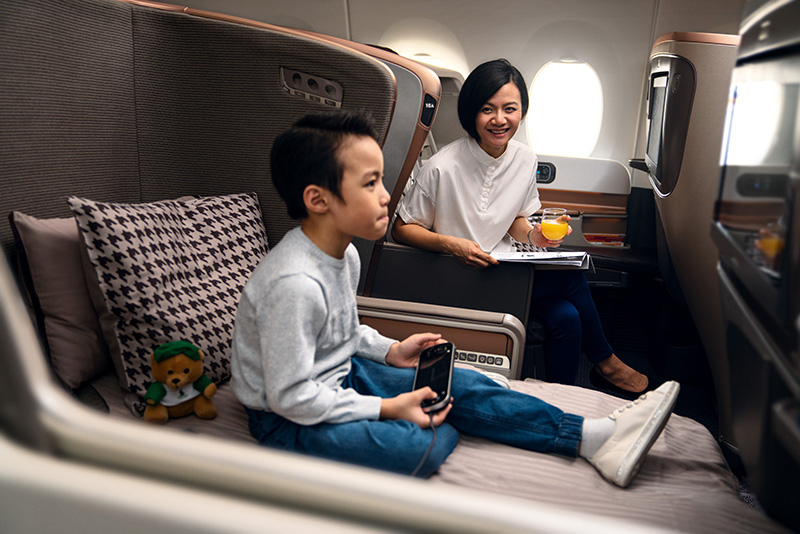
- Families in Singapore with children under 12 can travel to Germany, but will have to use the ‘Category II’ travel lane on their return (7 days home SHN).
- Families in Germany with children under 12 will not be able to travel to Singapore.
This is disappointing news for many, and errs very much on the side of caution from Singapore’s perspective. Hopefully we will see some relaxation here as the pilot scheme progresses.
Meanwhile it looks likely that vaccines will be approved for children under 12 in the months ahead.
Yes – sort of . If you wish to travel to other European countries for example, this is possible, and you don’t even need to fly from Singapore to Germany in the first place to use the VTL on your return.
The 14-day travel history restriction will still be enforced , however, so you’ll have to finish your trip in Germany for at least two weeks before taking your VTL flight home, if you have visited another country.
Otherwise you will have to take a non-VTL flight home, with arrival restrictions imposed for the highest risk country in your 14-day consecutive travel history applicable.

While the Schengen zone in Europe is ‘borderless’, remember you will have to make a health declaration prior to using the VTL stating that you have only been in Singapore and/or Germany for the last 14 consecutive days.
False declarations can result in enforcement under the Infectious Diseases Act.
To qualify for SHN-free arrival in Singapore, the VTL will require you to travel on designated flights from Germany to Singapore, operated by Lufthansa and Singapore Airlines.
These flights will only carry VTL passengers (no transit passengers or unvaccinated travellers are allowed). Masks will still have to be worn except while eating and drinking, and SIA crew will continue to offer a simplified meal service to reduce interaction.

Inaugural flights
SIA will operate its inaugural VTL services from Germany to Singapore on 7th and 8th September 2021, with Lufthansa following on 16th September 2021, as shown below.
Frankfurt Singapore
Munich singapore.
Remember, since Singapore’s entry restrictions for VTL travellers take effect on 8th September 2021, the overnight SQ325 flight departing Frankfurt on 7th September 2021 is the first eligible service, landing into Changi the following afternoon.
Initially, five Germany – Singapore services per week will qualify for the VTL process, three from Frankfurt and two from Munich, operated by Singapore Airlines.
Germany to Singapore VTL flights (7th – 15th September 2021)
* Next day (e.g. if you depart on Monday, the local day when you arrive will be Tuesday)
Once Lufthansa joins the VTL on 16th September 2021, there will be daily service with seven designated Germany – Singapore services per week, five from Frankfurt and two from Munich.
Germany to Singapore VTL flights (from 16th September 2021)
There are some minor timing adjustments to these services in the northern winter schedule from November 2021, however flight numbers and days of operation remain the same.
There are no designated VTL services from Singapore to Germany.
The VTL only applies for your return to Singapore, therefore travel from Singapore to Germany can be on any non-stop flight, without impacting your 14-day travel history for the Germany – Singapore (VTL) leg.
VTL flights are marked
Singapore Airlines is marking which flights are available to those wishing to use the Vaccinated Travel Lane between Germany and Singapore, for bookings on its website or mobile app.

Be careful not to book other Singapore Airlines flights , like SQ25 from Frankfurt to Singapore. These are non-VTL services, including transit passengers, and even though you are fully vaccinated you will not be allowed to follow the VTL process on arrival if you travel on one of these flights.
Lufthansa isn’t making it quite so clear unfortunately, only warning you that your flight is operating as a VTL service after you have selected it and proceeded to the ‘Configure Your Trip’ page, with a small advisory then appearing.

Transit flights
It is important to note that any transits (e.g. Singapore – Doha – Frankfurt) will reset your 14-day travel history ‘clock’ when it comes to using the VTL for your return trip.
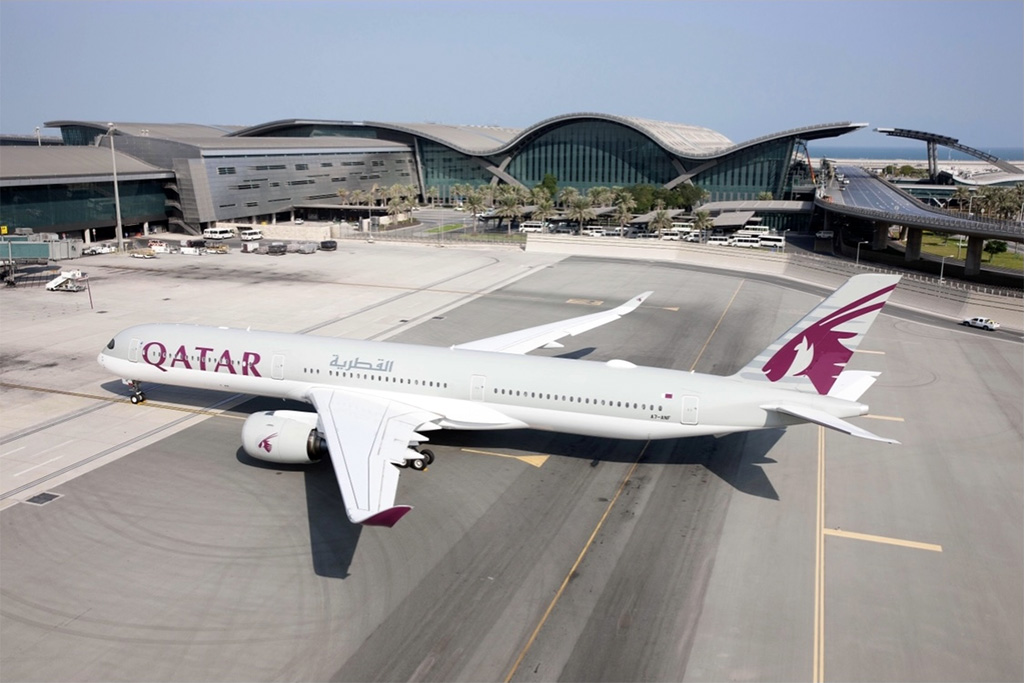
For example if you take an indirect routing to Germany, you’ll then have to spend at least 14 clear days there on arrival before being eligible to take a VTL flight to Singapore.
If you take the Scoot flight to Berlin via Athens , you will also need to spend 14-days in Germany before using the VTL to fly to Singapore.
Those who want to make shorter trips of two weeks or less, which is likely to be most of our readers, must therefore take a non-stop flight to Germany in order to use the VTL on the way home.

Singapore Airlines is deploying its four-class Boeing 777-300ER on designated VTL flights from Frankfurt to Singapore (SQ325), and its three-class Airbus A350 Long Haul from Munich to Singapore (SQ331).
Lufthansa is using its three-class Airbus A340-300s from Frankfurt to Singapore (LH778) during September and October 2021, upgauging to the four-class Boeing 747-8 from October 2021 November 2021 .
Here’s how the aircraft configurations compare:
Germany – Singapore VTL Aircraft Types
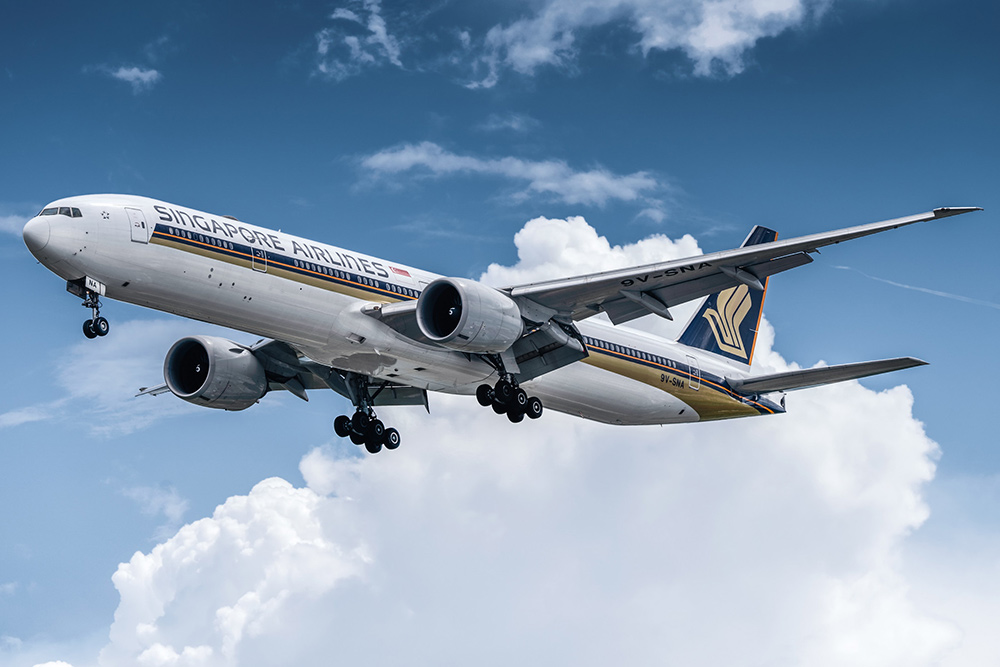
Singapore Airlines is now offering its 4-seat First Class cabin on VTL flights operated by its Boeing 777-300ER, having originally excluded the option when the scheme was first announced.

If you haven’t experienced it before, don’t miss our full review of SIA’s Boeing 777-300ER First Class.
Lufthansa is making First Class on its Boeing 747-8 available on its Thursday and Saturday VTL flights from 2nd October 2021 4th November 2021 .
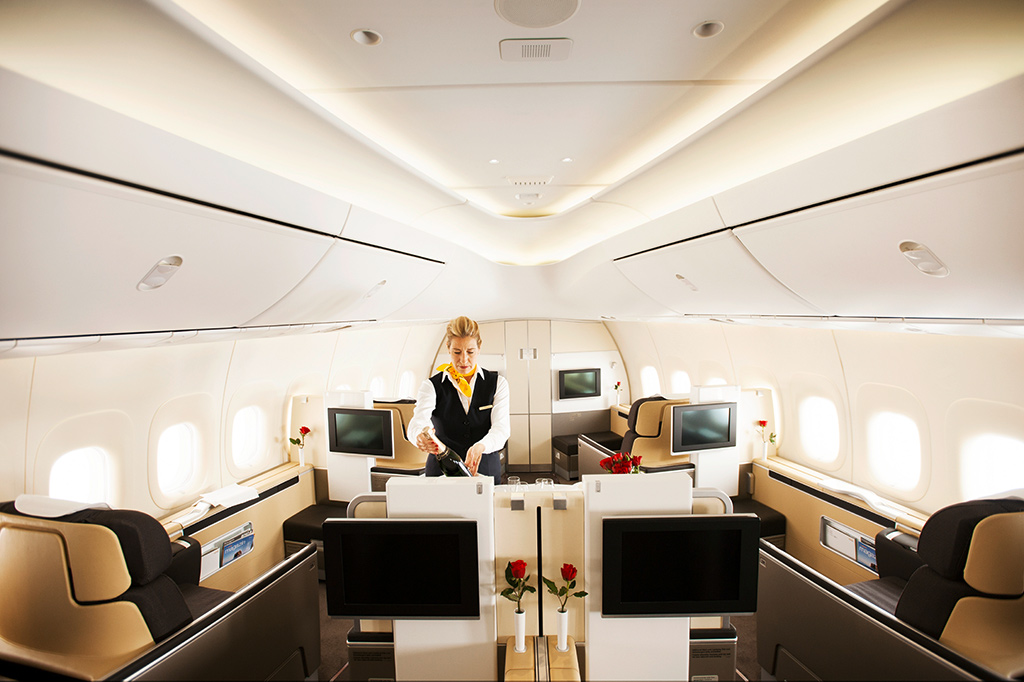
Pricing is of course not cheap, at around S$8,200 one-way from Singapore to Frankfurt or S$11,500 for a round-trip in this cabin.
In the other direction it’s even more expensive, from Frankfurt to Singapore starting at S$11,600 one-way or S$13,500 for a round-trip.
Economy ‘Sleeper Row’
On Lufthansa flights between Singapore and Frankfurt Economy Class passengers now have the option of paying extra at check-in for a row of three or four seats to themselves, including a mattress topper, pillow and blanket, from an additional S$255.
That’s great value for a long overnight flight, but there’s a catch! You can’t secure these rows in advance – they are based on availability and you won’t find out if the option is available until you check in.
On Singapore Airlines flights, it’s the popular long-haul 2013 Business Class seat in a 1-2-1 configuration to look forward to on VTL flights.
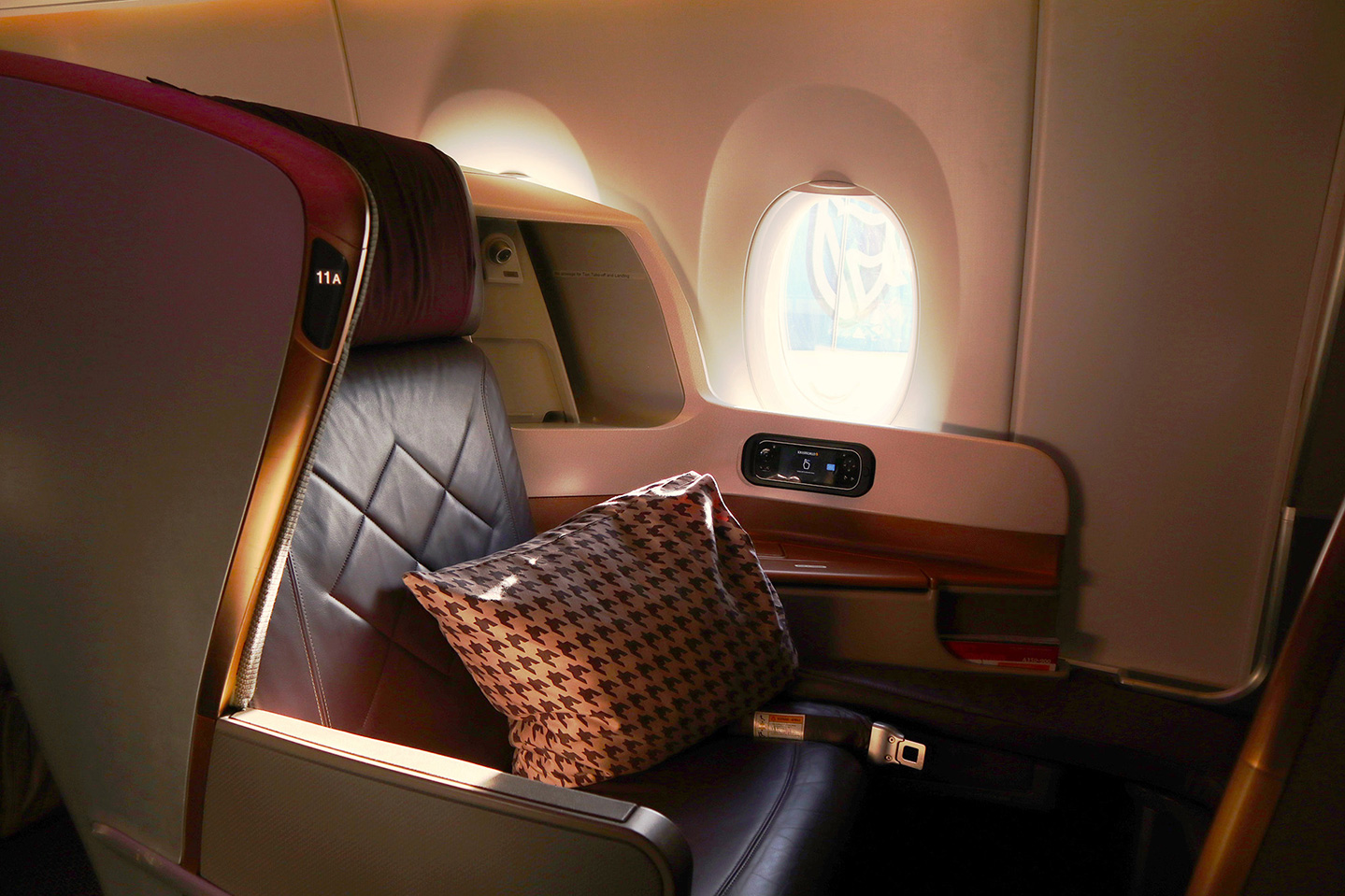
Those flying to or from Frankfurt on the Boeing 777-300ER get a slightly more spacious version of the same seat found on the A350 Long Haul.

Opting for a bulkhead seat will give you even more legroom, as follows:
Airbus A350
- 11A & 11K (window)
- 11D & 11F (middle pair)
- 19A & 19K (window)
- 19D & 19F (middle pair)
- 15A & 15K (window)
- 15D & 15F (middle pair)
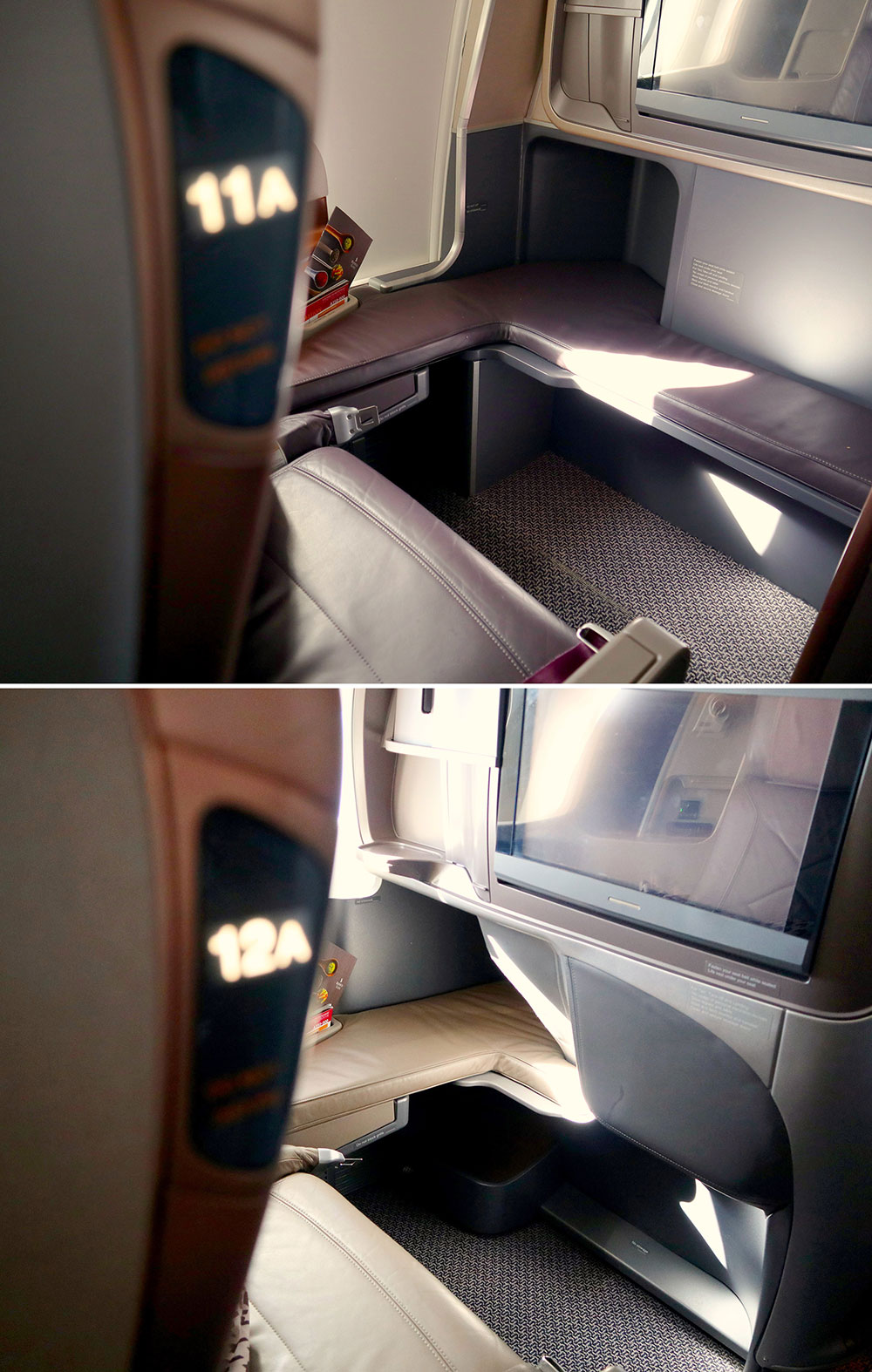
In Premium Economy it’s a small three or four-row cabin in a 2-4-2 configuration, so the window pairs here are good for couples.
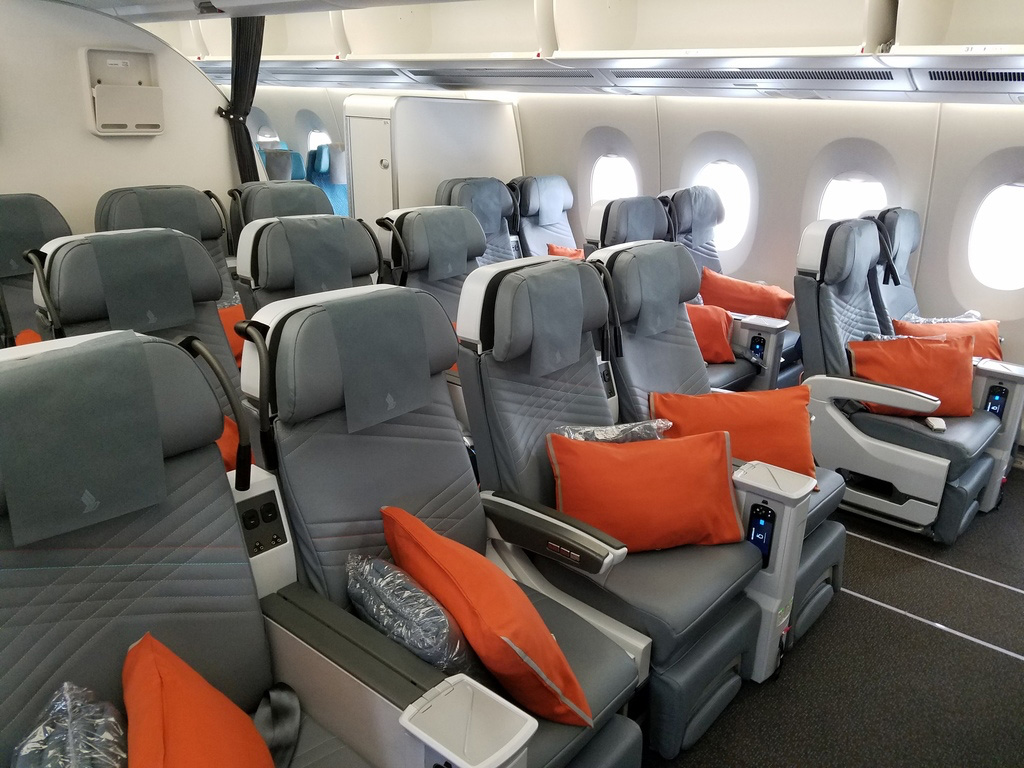
Good news again on the Boeing 777-300ER for those flying to or from Frankfurt – these seats are 19.5 inches wide (half an inch wider than on the Airbus A350).
In Economy Class it’s the 2013 seat on the Boeing 777-300ER and most A350 Long-Haul aircraft (80% of that fleet), or the newer 2017 seat if you’re on board a more recently delivered A350 LH.
Lufthansa’s Business Class seat is in a 2-2-2 configuration, unless you can snag the upper deck on the Boeing 747-8 where it’s a more intimate 2-2 layout.
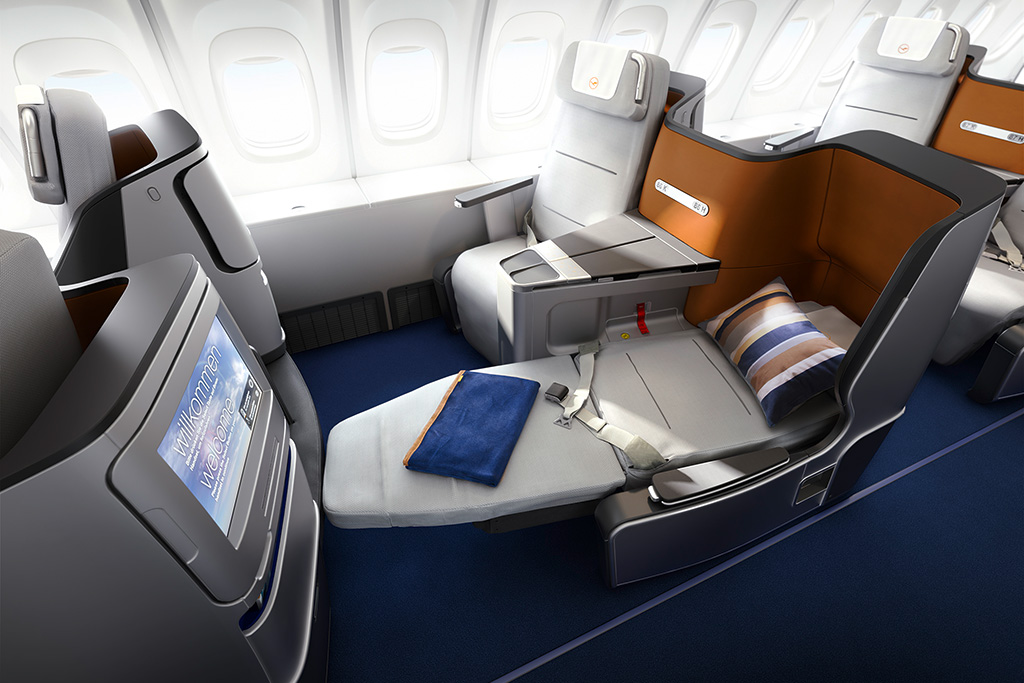
The seats don’t have much privacy, but work quite nicely for couples since they are angled slightly towards one another.
Here’s how current cash fares look on the Singapore – Frankfurt route during September and October 2021, based on a round-trip SIN-FRA-SIN booking, at the time of writing.
September & October 2021
Fares on SIA’s Munich route are similar to the airline’s Frankfurt rates.
Singapore Airlines is currently offering only Advantage redemption rates in First Class and Business Class on its VTL flights, with some additional Saver space available for PPS Club members, as usual.
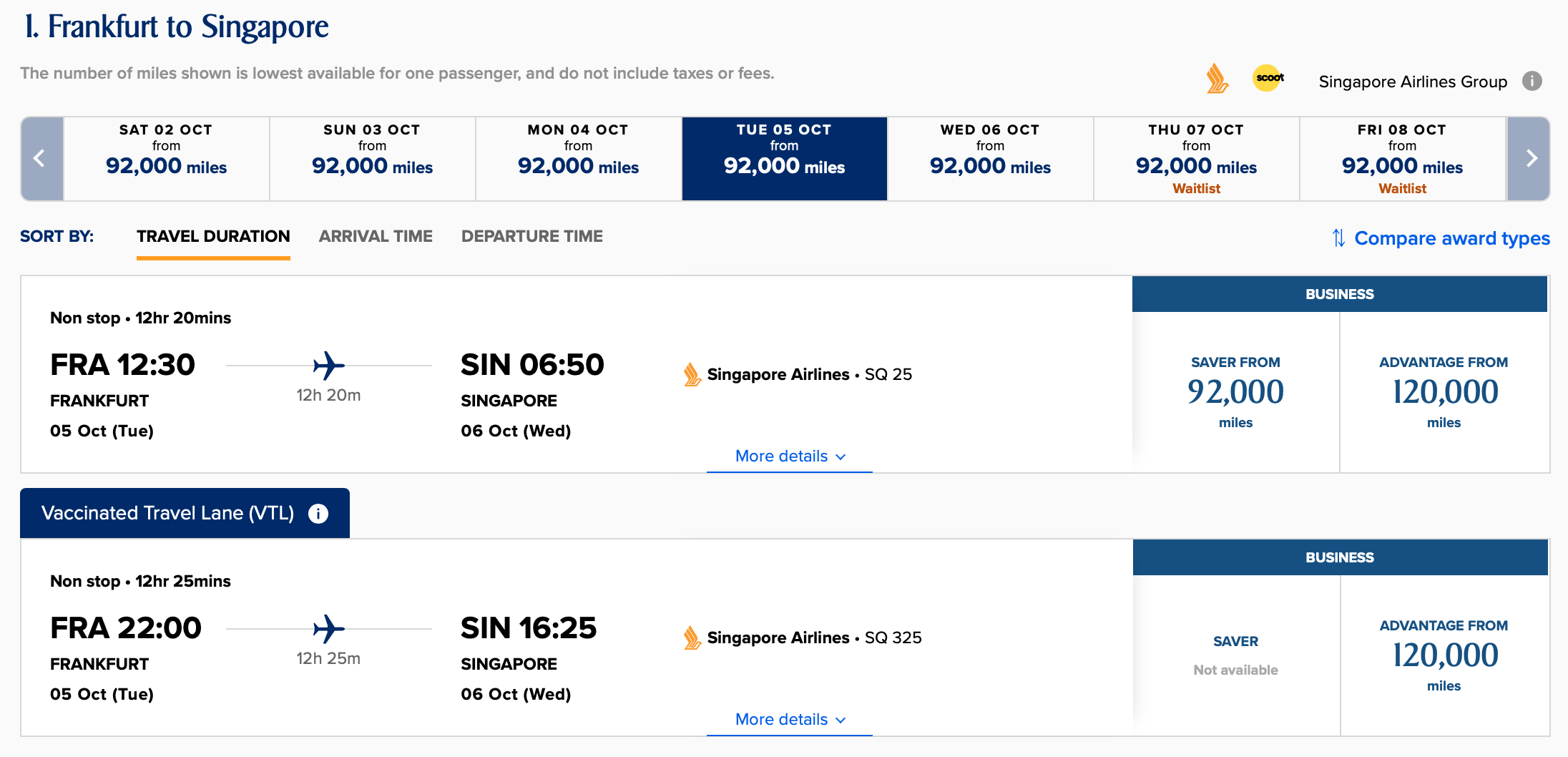
In Economy Class and Premium Economy Saver awards are on offer for all members.
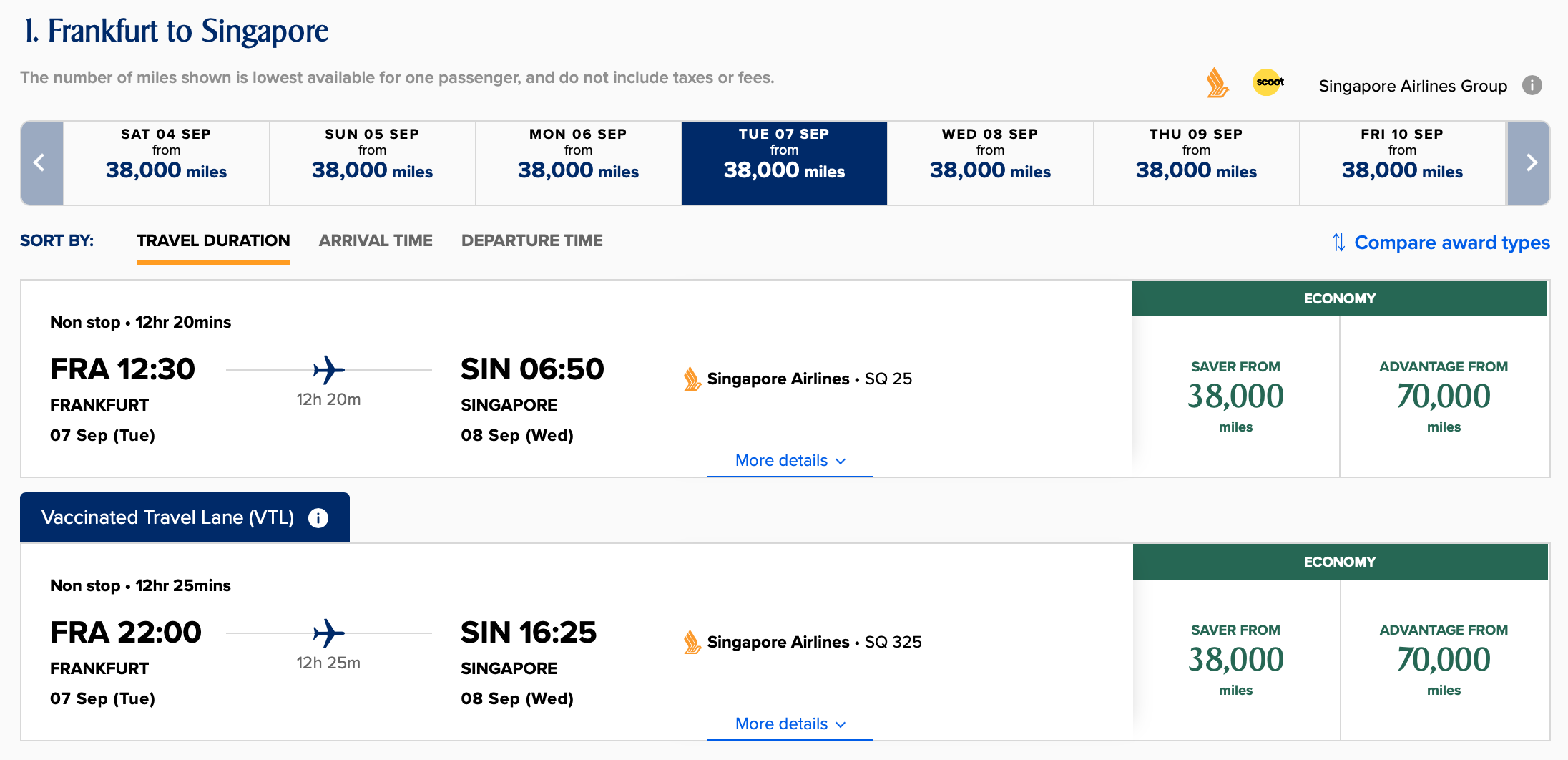
Redemption rates are as follows.
Singapore Airlines
* Taxes from Munich are slightly lower, at around S$145.
Note that you can’t currently redeem Singapore Airlines flights using miles or points in partner programmes (e.g. Lifemiles), due to COVID-19 complications.
Lufthansa awards will set you back much more in taxes and fees compared to a Singapore Airlines redemption, due to the airline’s high fuel surcharge.
Despite the higher taxes, an identical Business Class award rate for Lufthansa flights is worth considering from Frankfurt to Singapore if you can find award space and SIA still only has Advantage seats available.
This could be combined with a one-way SIA Saver redemption from Singapore to Germany, which are more widely available since any flight can be taken.
Lufthansa typically only offers its First Class cabin for redemption using partner frequent flyer programmes like KrisFlyer 14 days before departure.
Here’s how the process works, assuming travel from Singapore to Germany and back again via the ATL.
Pre-departure process (Singapore to Germany)
Ensure you are fully vaccinated against covid-19 before departure, enabling you to use the vtl on your return, book any non-stop flight to germany, if your stay there will be less than 14 days. for longer stays, you can take a connecting flight and still use the vtl on your return, pre-departure process (germany to singapore), ensure you are have received both doses of an eligible covid-19 vaccine 14+ days prior to departure date, apply for a vtp approval (for singapore long-term pass holders and visitors only), prepay for day 3 and day 7 post-arrival covid-19 pcr tests, book a designated vtl flight, submit your online sg arrival card, take a pre-departure covid-19 pcr test, bring a mobile device with the tracetogether app downloaded and registered, your vaccination certificate and vtp, bring proof of covid-19 insurance (not required for singapore passport holders or long-term pass holders), post-arrival process (germany to singapore), take an arrival covid-19 pcr test (day 1), activate your tracetogether app (short-term visitors only), take private transport (e.g. taxi or grab) to your self-isolation location, which can be your own home for singapore residents, or a designated hotel. remain there until you receive a negative result. this may take six to eight hours., make an appointment for your day 3 and day 7 covid-19 pcr tests, take a covid-19 pcr test at a designated clinic * by 3pm (day 3 is 2 days after your arrival day. there is no need to self-isolate awaiting results), take a covid-19 pcr test at a designated clinic* by 3pm (day 7 is 6 days after your arrival day. there is no need to self-isolate awaiting results).
* The list of 36 designated clinics in Singapore has now been released . You do not need to visit the same designated clinic for your Day 3 and Day 7 swab tests.
Here’s your checklist of items you’ll need to have with you before you head to the airport to check in for your VTL flight.
If you’re in Singapore on an Employment Pass, S Pass or Work Permit, or you are flying in from Germany as a short-term visitor, there’s an extra step if you want to use the Vaccinated Travel Lane, which is to apply for a Vaccinated Travel Pass (VTP) .
Applications for the VTP opened on 1st September 2021, 0001 hours (Singapore time).
You must apply for the VTP must be made between seven and thirty calendar days prior to the intended date of entry into Singapore.
Once issued, the VTP is valid for single entry up to six calendar days from the intended day of entry to Singapore, giving you some flexibility if you need to take a later VTL flight than originally planned.
Returning Singapore Citizens and Permanent Residents who are fully vaccinated will automatically qualify and will not need to apply for the VTP in order to travel under the VTL.
Check out our detailed guide on the VTP application process.
The VTL for travel from Germany to Singapore requires four COVID-19 tests, with a total cost of around S$460 to S$550 per person, as outlined below.
* Prices vary between providers and locations.
This high cost per traveller will remain a deterrent for many, especially families, who will be forking out significant additional testing expenses in addition to flight and hotel costs.
Here is the latest list of approved clinics performing pre-departure PCR tests for VTL passengers:
Germany pre-departure clinics
After arrival in Singapore, Day 3 and Day 7 tests must be conducted at one of 37 designated Raffles Medical clinics .
Update: The latest addition to the list is the only 24-hour testing option, Raffles Medical at Changi Airport T3.
Day 1 is your arrival day, so you are actually taking these tests 2 days and 6 days after arrival in Singapore (e.g. land Monday, Day 3 test on Wednesday , Day 7 test on Sunday ).
Now we’ve flown on the VTL, check out our testing experiences in both Germany and Singapore.
According to CAAS, you must take your pre-departure test within 48 hours of your VTL flight departure time when travelling from Germany to Singapore.
“Travellers must undergo this test within 48 hours before the scheduled departure time of their designated VTL flight to Singapore and obtain a negative test result certificate in English.” Civil Aviation Authority of Singapore
That would mean, for example, that if you are departing from Frankfurt on SQ325 at 22:00 on Tuesday 7th September 2021, you must not take the test earlier than 22:00 on Sunday 5th September 2021.
The ICA also gives a similar example in its FAQs .
Luckily in Germany, COVID-19 PCR testing clinics generate results within 24 hours or even as short as 2-4 hours if you’re willing to pay extra.
With four COVID-19 tests on the journey between Germany and Singapore under the VTL programme, it’s a reasonable query to ask what will happen if you test positive for COVID-19!
If you test positive for COVID-19, Singapore Airlines says you may request for a refund for the unused portion of your ticket, with cancellation fees waived.
Overseas visitors who test positive for COVID-19 in Singapore will be sent to a government hospital for medical treatment.
Singapore residents overseas who test positive for COVID-19 will have to arrange treatment at their own expense.
If you test positive in Germany from a PCR test, the test provider is required to notify the local health office (Gesundheitsamt), which is responsible for monitoring self-isolation and will provide further guidance in individual cases.
You must then self-isolate in your home or where you are staying locally, or in another appropriate location enabling self-isolation. You may only leave your self-isolation location to carry out PCR tests.
Germany does not operate a system of managed quarantine in government facilities.
Mandatory self-isolation ceases once you record a negative PCR test. Otherwise self-isolation lasts for 14 days, or until the local health office confirms release.
Do note that you’ll be unable to return to Singapore within 14 days of testing positive for COVID-19, even if you can produce a negative PCR test sooner than that.
Short-term visitors travelling to Singapore on a VTL flight must purchase travel insurance, with a minimum coverage of S$30,000 for COVID-19 related medical treatments and hospitalisation costs, prior to travel to Singapore
Even for Singapore residents, it’s a very good idea to have travel insurance that also covers COVID-19 before your trip.
Options for Singapore residents visiting Germany include SIA’s own coverage (from AIG), now including enhanced COVID-19 clauses.
It’s also possible to get travel insurance from a third-party provider as usual, several of which include COVID-19 cover, including:
- NTUC Income
Unlike the now-defunct Hong Kong Air Travel Bubble, where a specific set of criteria was outlined for suspension of quarantine-free travel, operation of the VTL is at the discretion of the Singapore Government.
“Given the evolving nature of the COVID-19 pandemic, the relevant authorities in Singapore may, at their own discretion, introduce new measures or requirements to safeguard public health. This may include changes to the VTL conditions or cancellation of the VTP at short notice. Travellers will be notified of changes to the VTL conditions or cancellation of their VTP.” Singapore ICA
If your Singapore Airlines flight is cancelled or reverted to a non-VTL flight, you will be eligible for a refund, with a waiver of any applicable cancellation fees, including for non-refundable fare types and award tickets.
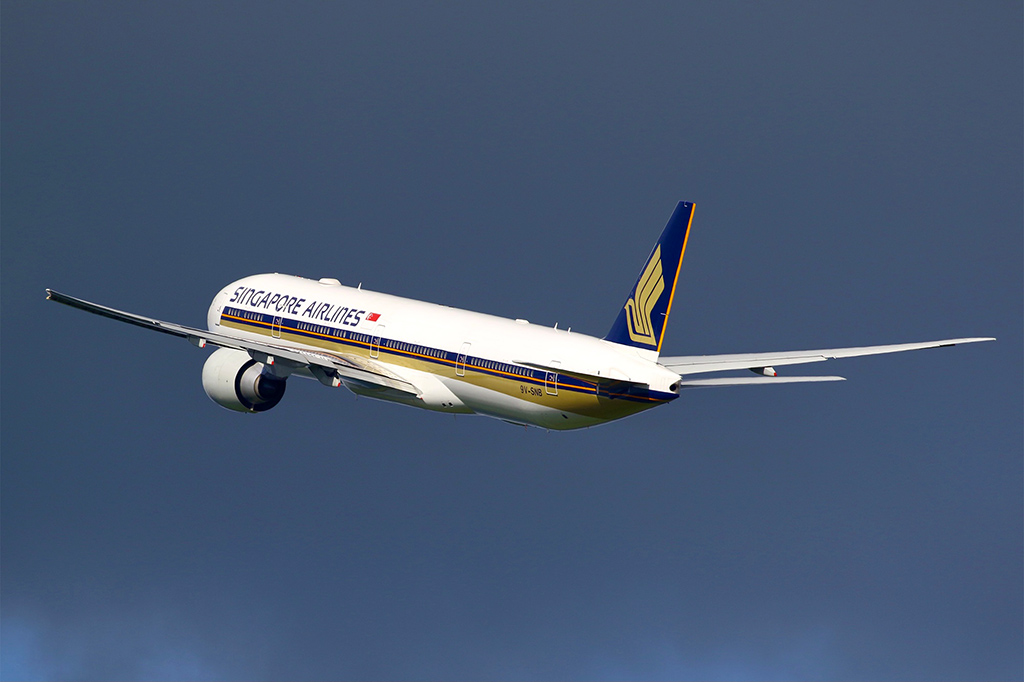
We are clarifying Lufthansa’s policy at the time of writing and will update this section with their response.
If you are unable to return to your Singapore before a suspension or cancellation of the VTL takes effect, you will have to either wait for the VTL to resume (assuming that’s proposed), or complete the prevailing SHN period for arrivals from Germany in force at the time.
Here’s how it currently looks, with Germany as a ‘Category 2’ country:
Return to Singapore
- COVID-19 PCR test on-arrival
- Seven-day SHN at self-sourced accommodation, including place of residence and COVID-19 PCR test at the end of SHN
Bear in mind, however, that if the VTL is suspended or cancelled, Germany’s status will probably have become more restrictive (Category 3 or 4).
If you can work from home and live alone, or everyone in your household travels with you on the same itinerary, it’s arguably much easier to follow the ‘Category 2’ travel lane from Germany to Singapore and then self-isolate in your residence for 7 days.
This allows you to take any flight, including those with transits in Category 1 and 2 countries (e.g. Hong Kong and the Netherlands).
Since vaccination is not required, unvaccinated and partially vaccinated travellers can use these arrival procedures, also meaning you can travel with children under 12.
With one less PCR test , costs are also reduced.
There’s also the opportunity to more easily snag a Saver award rate, rather than an Advantage one, or transit in Hong Kong if you wish, plus you can travel straight away – no need to time your return date for 8th September onwards.
The VTL on the other hand could be costing you more miles and more money – while involving additional testing and less travel flexibility – for 7 days of freedom in return.
Please also refer to these official resources for details of the latest VTL process, which may be updated periodically.
- CAAS: VTL requirements
- SIA: Germany – Singapore VTL
- Singapore ICA: VTL requirements and process
Singapore is starting small and cautiously with its first major Vaccinated Travel Lane country – Germany.
It’s not the simplest travel process, and the testing is expensive, but with the recent death of the Hong Kong Air Travel Bubble this does represent the first real two-way quarantine-free leisure travel opportunity for most of us in over 18 months.

Let’s hope the arrangement goes ahead smoothly, and proves that high vaccination levels and testing are our keys to unlocking future travel arrangements like this one.
We’ve hopefully covered most if not all of the VTL’s detailed aspects here, but if we missed anything, made a mistake or you have any other questions, let us know in the comments section below .
Share this:
- Click to share on Facebook (Opens in new window)
- Click to share on Twitter (Opens in new window)
- Click to share on Telegram (Opens in new window)
38 comments
Awesome summary thanks! So we don’t have to stay Germany for at least 21D right? Because I read it that way from ICA
No there is no minimum stay requirement. Provided your travel history solely includes Singapore and Germany in the last 21 consecutive days, you can take a VTL flight from Germany to Singapore.
Just go for the day, if you like!
I am puzzled how the Singaporean or German authorities can check your 21 day travel history in Europe – once in Germany there are no boarder controls with countries like France, the Netherlands or Austria?
You must self-declare that you have remained in Singapore and/or Germany for the last 21 consecutive days. There are penalties for false declarations.
I agree with you that SG can’t easily check your travel history at the Europe side. That doesn’t mean they can’t subsequently prove non-compliance if they suspect it, investigate at random, or get tipped off.
It’s not worth it.
A clarification on Category II. I was rather confused whether someone returning from Germany can actually serve their SHN at home (with own room and toilet) but mix with other people who didn’t travel with you (eg. domestic helpers, other residents of the same home). The rules on ICA’s website doesn’t explicitly say that you can’t, even though the general rule for 14 days SHN says you can’t.
So I called ICA and spoke to someone to clarify (they appear to be aware of this). The response was, “since the website didn’t explicitly mention this, you’re allowed to mix with people who don’t share your same travel history, as long as the requirement of room with adjoining toilet is met”. Interesting.
I agree it’s confusing.
But doesn’t what ICA told you go against its own requirements for home SHN here ?
“Avoid contact with other persons residing in the same place of residence who are not serving SHN with you.”
“If sharing a place of residence with others, stay in your own room at all times, and use a dedicated toilet.”
So a CAT II arrival sharing a residence with VTL returnees would be basically confined to their room for a week.
that’s unfortunately incorrect. i called them this morning to clarify exactly this point. If you are returning from Germany and you have to serve 7 day SHN and choose your own place of residence, you can only do so if EVERYONE registered at that place traveled with you. If there are people at your residence that didnt (like your helper) you have to file an appeal via their webpage and ask them to be “opted in” to your SHN. If they approve, everyone has to serve SHN, if they dont, you wont be able to serve your SHN at your own residence.
Refer to MOH announcement again: 7-day SHN at own residence doesn’t make reference to Annex A which describes further restrictions to doing it at own residence and application to opt out of SDF. Only 14-day SHN makes references to Annex A.
Agree with you that Category 2 is way more practical! This VTL is a joke with the extra tests specific flights and so on so forth. I’ll go to Germany but with 7 day SHN in residence for sure, not this stupid VTL!
It is more meaningful for a German executive coming to Singapore for business.
Not to mention the only option for them, and for short-term visitors from Germany coming as tourists to escape the cold this winter!
They can even move on from Singapore to Phuket and use the sandbox, then return home after some beach time. Oh to have such freedoms!!
With the Category 2, I reckon you’d also avoid the risk of testing positive in Germany and having to spend more days there than you would want before returning to SG.
But wouldn’t the risk of being positive in Germany be the same for VTL and Cat II – because you undergo the same PCR test at Changi upon returning?
On-arrival PCR test at Changi is fine since you’re already in Singapore (and equal on both fronts). But Cat II does not require pre-departure test in Germany. It’s quite sian when you sway sway kena false positive in Germany.
The benefit of VTL (if you qualify) is that you have the option of flying First which is not the case for the non-VTL flights — should that be of interest to you. SQ mentioned they will open F for booking soon’ish.
Thank you for this guide, which is truly useful!
I’ve been looking at the fine print on the ICA site referencing to the 21 days in Germany. I believe that if I’d interpreted it correctly, if my flight from Germany is 24 September, that means I must have been on Germain soil (continuously) from 4 September. Which is 21 days.
If I’m on German soil only from 4 September around 2 pm, but my flight on 24 September is at 11 am, I suppose we’re not going into the details of hours, right? Or have I interpreted this incorrectly?
You’re not alone – quite a few people have been misinterpreting this requirement!
You must have spent the last 21 consecutive days in Germany and/or Singapore to use the VTL flight to Singapore.
If you have travelled to a different (third) country on your trip, like France, then you’re right you will have to spend a ‘fresh’ 21 clear days in Germany to be eligible for the VTL, but if you’ve simply travelled non-stop from Singapore you can stay in Germany for as little time as you like (e.g. arrive 2pm, leave 10pm the same day on VTL is fine!).
Hope this clarifies.
Thank you. I’m wondering if they count the number of hours, going into the details. The e.g. I’ve cited above, 4 September is not a full 24 hours to count as one day, and 24 September is also not a full day either. So what do they mean by “day” exactly?
They don’t go into that much detail so I would suggest contacting ICA about that.
Worst case – assume 21 clear consecutive calendar days are needed (i.e. not including your date of arrival in Germany from a country other than Singapore, and not including your date of departure to Singapore on the VTL).
The official recognized lists ( https://www.moh.gov.sg/covid-19/statistics/accreditation-bodies-for-covid-19-testing as per MOH and SIA) for the PCR Testing Centers in Germany is really suspicious and strange.
I am German and the webpages they link to are privately owned and maintained lists (i would assume with paid for listings). Out of curiosity I contacted 2 of the test centers and indeed their pricing is more than double than the usual tests (140 Euro vs 65 Euro). Furthermore I contacted my regional Health Officials and they directed me towards the official Hospital Test Centers of regional towns, not the private clinics listed on the webpage linked by MOH and SIA.
Wonder how they arrived at choosing these links, they are clearly not correct nor representative.
Wondering whether HK allow transit passengers to stay a few days in HK before returning to Singapore? Any restrictions ?
Passengers transiting through Hong Kong SAR, China must: – have a connecting flight booked on the same ticket, and – have all the boarding passes printed, and – have their baggage checked through until their final destination.
Doesn’t seem likely!
Germany as a ‘Category II’ country does not require pre departure PCR. They should remove this pre departure PCR for VTL at least for Singaporean.
On the contrary. The government has just INSTITUTED pre departure PCR to Cat II countries!
https://www.moh.gov.sg/news-highlights/details/updates-on-border-measures-for-travellers
Or add pre departure PCR requirement for category 2, as they have now done!
I’ll also add that the VTL is the only likely option for the 400,000 EP and S-pass holders in Singapore. Getting MoM approval has been notoriously difficult over the last 18 months, so looking forward to the first opportunity we get to travel again!
If I travel to Germany and back to Singapore under non-VTL flights, can I spend sometime outside of Germany (in EU) while I am there, for example, go visit nearby Switzerland before going back to Germany to take the non-VTL flight back to Singapore. Would the 7-day SHN and 2 PCR tests still apply?
No the 14-day home SHN (for fully vaxxed) would apply because Switzerland is Category 3. Also a pre departure PCR, on arrival PCR and Day 14 PCR.
Basically the rules for the most restrictive category apply within your 21-day travel history.
Travellers using category 2 (that are vaccinated but are opting to not using VTL and go to 7 days home quarantine instead) returning from Germany to Singapore needs to submit anything to the government or obtain any pre approval?
Not for Singapore Citizens or Permanent Residents I believe.
Pass Holders would have to obtain entry approval and tourists (short term visitors) would not be allowed though.
If we want to travel with kid below 12 years of age what SHN rules will apply while coming back to Singapore for Singaporean/PR.
You will all need to self-isolate at home for 7 days and travel on a non-VTL flight from Germany.
Thanks for your reply.. If we have helper at home who is not travelling with us , can we still do Self-Isolate at home for 7-days. We have option to send our helper to our relative’s place for 7 days.
Check with STO to be sure but I think your helper can stay for the 7-day SHN for Category 2 arrivals like this.
“Serve a 7-day SHN in one of the following….
…Place of residence (only occupied by the pass holder or family, including any helpers)”
It doesn’t say your family or helper must share your travel history.
That’s quite different from the 14-day home SHN option for Category 3 countries, which is much more strict and says you have to occupy your accommodation alone (i.e. no domestic helpers), or with family members/helpers, who are also vaccinated and have the same travel history, arrival date and SHN duration as you.
You didn’t include the PCR or Antigen test we need to take before arrival into Germany from SG
The best guide I have seen. You saved me by detailing that you cannot book a transit flight to return on a VTL, which I did initially. There was no clear information anywhere that I could find, or at least not in one place. This was the most helpful information I could find anywhere.
Hi Andrew, I looked at the Lufthansa flight 778 in December but it says the current schedule for the Thursday and Saturdays VTL flights are only confirmed up till 30th October. Would it be safe to assume the the VTL schedule will remain the same till December as written in your guide?
Also, would it be safe to book the LH-SQ codeshare flight through SQ website marketed as SQ2007 operated by LH778? It is not indicated as a VTL flight on SQ website, although on LH website it is marketed as a VTL flight. Thanks!
Yes I expect Lufthansa will continue to operate LH778 on Thursdays and Saturdays as VTL services, though this is subject to confirmation as the airline has still to confirm its winter schedule from 31st October.
Booking a Lufthansa VTL flight as a codeshare under SQ flight number probably isn’t programmed in the system to show up as VTL on the SIA website, but it shouldn’t be a problem and you’ll still have to comply with all the VTL requirements to travel on that service.
Leave a Reply Cancel reply
Discover more from mainly miles.
Subscribe now to keep reading and get access to the full archive.
Type your email…
Continue reading
- Reward types, points & expiry
- What card do I use for…
- Current Credit Card Sign Up Bonuses
- Credit Card Lounge Benefits
- Credit Card Airport Limo Benefits
- Credit Card Reviews
- Points Transfer Partners
- Singapore Airlines First & Business Class Seat Guide
- Singapore Airlines Book The Cook Wiki
- Singapore Airlines Wi-Fi guide
- The Milelion’s KrisFlyer Guide
- What is the value of a mile?
- Best Rate Guarantees (BRGs) for beginners
- Singapore Staycation Guide
- Trip Report Index
- Credit Cards
- For Great Justice
- General Travel
- Other Loyalty Programs
- Trip Reports
Singapore residents to enjoy quarantine-free travel to Germany from 8 September
Travellers from Germany will no longer have to serve an SHN from 8 September, with the launch of the new Vaccinated Travel Lane.
Well it looks like I have egg on my face now. Delicious, nourishing egg. On the same day I wrote about how Singapore’s rumoured pilot programmes for business and leisure travellers were a step in the wrong direction, they’ve gone and announced something very different.
From 8 September 2021, fully vaccinated Singapore residents will be able to travel to and from Germany and Brunei with no quarantine requirement on either side , under a newly-formed Vaccinated Travel Lane (VTL) agreement.
Overview: Vaccinated Travel Lane
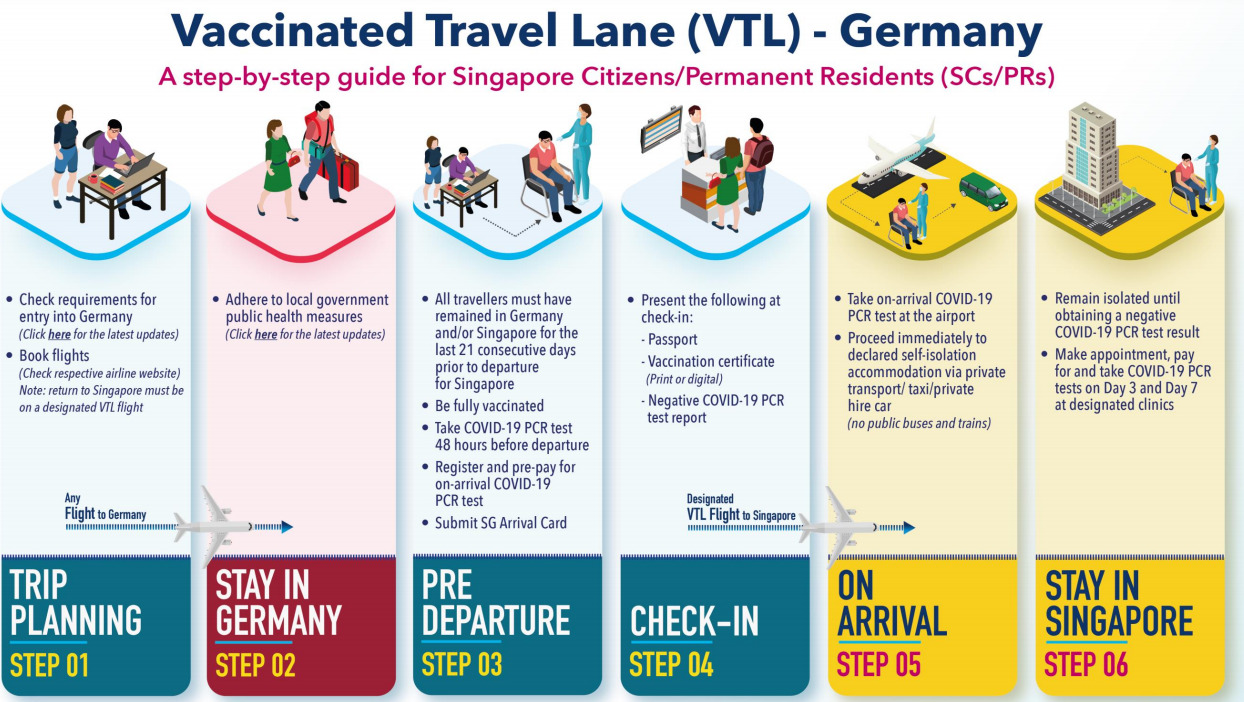
VTL Full Details (CAAS)
To avoid an SHN on return to Singapore, VTL travellers must:
- Apply for a Vaccinated Travel Pass (VTP) between 7 and 30 days before their intended arrival in Singapore (not required for Singapore Citizens and Permanent Residents)
- Take a pre-departure PCR test within 48 hours of their scheduled flight departure from Germany/Brunei
- Travel on a designated VTL flight from Germany/Brunei
- Take an on-arrival PCR test at Changi Airport
- Take post-arrival PCR tests on day 3 and day 7 after arrival, at a designated clinic
A few things to note.
First, the VTP requirement is only for short-term visitors and long-term pass holders, and applications will open from 1 September 2021.
Second, children aged below 12 are currently not eligible to receive the COVID-19 vaccine, and therefore cannot travel on the VTL.
Third, on arrival back in Singapore, you’ll need to complete a PCR test and head directly to your self-isolation accommodation in a private vehicle, private-hire car, or taxi (no public transport). You’ll need to isolate until your PCR test result comes back- if it’s negative, you can move around as per normal.
Fourth, VTL travellers must have remained in Singapore, Germany or Brunei for the last 21 consecutive days prior to departure for Singapore. In other words, taking a road trip from Germany to neighbouring countries will disqualify you from SHN-free travel, even if you ultimately fly back from Germany (unless, of course, you do a road trip outside Germany, return to Germany and spend 21 days, then fly home).
Fifth, it goes without saying that all VTL travellers must be fully vaccinated, defined as 14 days after completing the full regimen of Pfizer-BioNTech/Comirnaty, Moderna or other WHO Emergency Use Listing vaccines.
The CAAS further stipulates that the vaccination must have been done in Singapore, Germany or Brunei. This means that individuals who were vaccinated overseas will not yet be eligible for the VTL, even if they got their vaccination recognised here.
Designated Flights
VTL travellers must take one of the designated flights below in order to avoid an SHN on arrival.
You can travel on any flight from Singapore to Germany, since Germany permits entry for Singapore residents without any specific flight restrictions.
PCR Testing Requirement
Travelling on the VTL won’t be cheap. While Germany does not have a pre-departure COVID-19 test requirement for Singapore residents, they’ll still have to do four tests in total – one before departing Germany, and three when back in Singapore.
I haven’t researched PCR pricing in Germany , but I do know that the Changi Airport test costs S$160, and the Day 3/7 tests will cost S$94.16 each. The Day 3 and 7 PCR tests must be made at a designated clinic (list yet to be released), using a unique booking link which will be emailed to you. Tests must be done by 1500 on each relevant day.
Those who fail to complete the PCR tests on return to Singapore may be served with an SHN to quarantine in a dedicated facility, so don’t mess around with this.
At long last, SHN-free travel is a (practical) reality. While Brunei may not be everyone’s cup of tea (and in any case, isn’t taking short-term visitors), Germany is a great prize indeed.
There’s a lot to dig into here, so look out for further articles on The Milelion in the next couple of days.
- singapore airlines
Similar Articles
Hack: skip the immigration lines in kuala lumpur with priority pass, details: changi terminal 2 northern wing reopens, 22 comments.
Fingers crossed that cost of PCR tests will be reduced to make travel more affordable.
Pity that no exemption granted for children who cannot be vaccinated.
Today is a good day.
Hi Aaron and friends, I was wondering since Europe has open borders, practically speaking, how would the Singaporean government know if we travel outside of Germany (eg. Holland/France etc) within the 21 day period? Happy to hear your comments!
you will make a self-declaration. God help you if you lie.
Don’t screw this up for the rest of us! Be honest!
They can but for practical purposes won’t. But there is a local saying that while shrewdness is good, don’t try to be too clever.
A false immigration declaration could end very badly – an almost certain jail term for locals and revocation of work/residency passes for foreigners. Just stick to beer and sausages if you’re eligible this round. More importantly, don’t mess it up for the rest of us waiting to get out!
Exactly this.
Although I already foresee some individuals trying to circumvent Singapore’s SHN policy by traveling to germany, then onwards to Singapore without spending 21 days in Germany. ICA’s no doubt wise to these tricks, and the authorities are bound to make an example of the first person they catch.
You post on social media. Then the gov will know LOL
Dear Aaron, I do not understand “the past 21 consecutive days in Germany” requirements. Does it mean I must stay for minimum 21 days in Germany before I depart to Singapore via VTL flight? If I stay for 14 days in Germany only, do I meet the requirements. Thanks for help.
You can be in sg or Germany, either one. So yes
Why Singapore? Just curious. is your yes refer to my 14 days in Germany? Tks Aaron
You need to spend the last 21 days in either Singapore or Germany before stepping onto the plane. Any other country within the last 21 days disqualifies you from the VTL flights.
Arriving in DE from SG and staying for a weekend is fine.
Arriving in DE from UK/IT/FR and staying less than 21 days is not.
Same here. I also have trouble interpreting this sentence since there were no illustrative examples provided.
It says you have to be in Germany, Brunei or Singapore for the last 21 days. So if your travel originates in Singapore, you travel to Germany for 5 days, you still qualify because you would have 16 days in Singapore (unless you were one of the few who could travel elsewhere) plus the 5 in Germany.
It’s 21 days in Singapore OR Germany. The operative word is “or”.
I am still not too optimistic. If and when the VTL happens, demand for the flights will be sky high, and the tickets priced accordingly, at least until the end of the year. There will unlikely be award seats as well.
SQ has spare capacity – I’m sure they’ll happily add more flights, though prices won’t likely be cheap.
So if both parents (SC + PR) are fully vaccinated and our 1.5 yr old baby (SC) is not, VTL would not apply. And 7 day quarantine at home would still apply.
I booked the VTL flight trying my luck, they won’t deny boarding in this worst case scenario right?
Found the answer:
Can children under the age of 12 travel on a Vaccinated Travel Lane (VTL) flight as they are too young for vaccination?
As regulations specify vaccination certificates are a pre-requisite for VTL flights, children under the age of 12 who are ineligible for vaccination are unfortunately not allowed to travel on a VTL flight.
You may wish to consider travelling on a non-VTL flight. Passengers on non-VTL flights must meet the entry requirements for their travel itinerary. As regulations may change at short notice, do check the travel advisories issued by the local authorities before your trip.
Should I take the risk and keep the VTL designated return flight, hoping this will change or maybe write in for ICA?
Aiyo, so strict everything
If you’re okay leaving your unvaccinated baby behind in Germany as it will be denied boarding, sure, take the risk.
On a more serious note: You already found the answer. That’s the answer. They are creating an environment to transport vaccinated people into Singapore and they will stick to that.
As long as you’re all travelling together the 7 days SHN at home might actually be less cumbersome as it decreases the number of PCR tests to 2.
You can go with 7-day SHN option instead. Doesn’t matter if you fly on VTL or non-VTL approved flights then.
CREDIT CARD SIGN UP BONUSES

Featured Deals

© Copyright 2024 The Milelion All Rights Reserved | Web Design by Enchant.sg
Germany Travel Restrictions
Traveller's COVID-19 vaccination status
Travelling from Singapore to Germany
Open for vaccinated visitors
COVID-19 testing
Not required
Not required for vaccinated visitors
Restaurants
Not required in public spaces.
Ready to travel?
Find flights to germany, find stays in germany, explore more countries on travel restrictions map, destinations you can travel to now, dominican republic, philippines, puerto rico, south korea, united kingdom, united states, know when to go.
Sign up for email alerts as countries begin to open - choose the destinations you're interested in so you're in the know.
Can I travel to Germany from Singapore?
Most visitors from Singapore, regardless of vaccination status, can enter Germany.
Can I travel to Germany if I am vaccinated?
Fully vaccinated visitors from Singapore can enter Germany without restrictions.
Can I travel to Germany without being vaccinated?
Unvaccinated visitors from Singapore can enter Germany without restrictions.
Do I need a COVID test to enter Germany?
Visitors from Singapore are not required to present a negative COVID-19 PCR test or antigen result upon entering Germany.
Can I travel to Germany without quarantine?
Travellers from Singapore are not required to quarantine.
Do I need to wear a mask in Germany?
Mask usage in Germany is not required in public spaces.
Are the restaurants and bars open in Germany?
Restaurants in Germany are open. Bars in Germany are .
SIA to operate 5 weekly flights from Germany under new travel link for fully vaccinated passengers
Advertisement.
SINGAPORE — There will soon be seven designated flights from Germany to Singapore each week taking only fully vaccinated passengers, as the Government here gradually opens up borders for different groups of travellers based on vaccination status.
The first Singapore Airlines flight under a new Vaccinated Travel Lane arrangement will take off from Frankfurt in Germany to Singapore on Sept 7, 2021.

- Fully vaccinated travellers from Germany will soon be able to enter Singapore without serving stay-home notices
- There will be seven designated flights from Germany to Singapore each week for a start operated by Singapore Airlines and Lufthansa
- The first one from Germany will take off on Sept 7
SINGAPORE — There will soon be seven designated flights from Germany to Singapore each week taking only fully vaccinated passengers, as the Government here gradually opens up borders for different groups of travellers based on vaccination status.
Five will be serviced by Singapore Airlines (SIA) and the other two will be operated by German airline Lufthansa.
Mrs Elise Becker, vice-president of Lufthansa’s Asia-Pacific arm, told TODAY that as it currently has only one weekly flight between Singapore and Germany, it will be adding two more to make it three weekly flights in response to the relaxed border measures.
Two of these will be for the designated vaccine travel lane flights.
Under a new Vaccinated Travel Lane arrangement that was announced by Singapore on Thursday (Aug 19), fully vaccinated travellers from Germany will be able to come here without having to serve a stay-home notice as well.
This is provided that they meet a set of criteria including taking designated flights that serve only vaccinated travellers without transiting elsewhere. They will also have to undergo some tests after they are here.
Germany already allows travellers from Singapore to enter the country without quarantine.
The seven weekly flights are:
SIA flight SQ325 departing from Frankfurt on Tuesdays, Fridays and Sundays
SIA flight SQ331 departing from Munich on Mondays and Wednesdays
Lufthansa flight LH778 departing from Frankfurt on Thursdays and Saturdays
Other direct flights from Germany will continue, but travellers on these flights will not be considered as those on the Vaccinated Travel Lane and will be subject to the prevailing quarantine measures on arrival, the Civil Aviation Authority of Singapore (CAAS) said during a press briefing on Thursday.
CAAS said that travellers should refer to the airlines’ websites for the latest flight schedules.
The first SIA flight under the Vaccinated Travel Lane arrangement will take off from Frankfurt on Sept 7.
A check by TODAY at 10.30pm on Thursday found that a standard economy-class return ticket for the flight costs 1,077.73 euros (about S$1,717).
The SQ331 flight departing from Munich is going at 1,087.32 euros for a standard economy-class return ticket.
SIA said in a media release that customers with existing bookings will be notified if their flights have been placed under the Vaccinated Travel Lane or have been cancelled due to changes in the flight schedule.
Customers who do not meet the requirements for the travel lane may choose to be placed on another flight.
Should the new travel arrangements get suspended, SIA will adhere to the guidance of the regulators and customers will be informed of any changes.
And if the flights have to be cancelled or changed to one that admits passengers regardless of vaccination status, all affected customers will be eligible for a refund of their tickets.
Separately, fully vaccinated travellers from Brunei will be able to enter Singapore without having to serve a stay-home notice under the new Vaccinated Travel Lane as well.
There will be three flights designated for fully vaccinated travellers from Brunei to Singapore each week, one of which is operated by SIA. The other two will be serviced by Royal Brunei Airlines.
TODAY has reached out to Royal Brunei Airlines for comment.
WHAT AIRLINES SAY
SIA told TODAY that it “strongly supports all efforts to open the Singapore air hub in a safe and calibrated manner”.
“This is an important milestone in our recovery from the Covid-19 pandemic and helps to establish confidence in the safe resumption of international air travel with the necessary protocols in place,” it said.
Budget air carrier Scoot said that it, too, welcomes the easing of travel restrictions.
“Scoot will continue to monitor the situation and be guided by regulatory requirements as we adjust our capacity to meet the growing demand for air travel.”
Mrs Becker from Lufthansa said that the airline is “delighted” that Singapore no longer requires quarantine for fully vaccinated travellers from Germany.
“It is more important than ever that a leading country like Singapore joins forces with other countries to create reliable travel solutions and starts moving towards a post-pandemic world.
“Lufthansa Group, together with its joint-venture partner Singapore Airlines, is looking forward to playing an integral part in this development,” she said.
In Singapore, 77 per cent of the population have received two doses of a Covid-19 vaccine. In Germany, it is close to 60 per cent, based on data from the Bloomberg Vaccine Tracker.
Related topics
Read more of the latest in
Stay in the know. Anytime. Anywhere.

Subscribe to get daily news updates, insights and must reads delivered straight to your inbox.
By clicking subscribe, I agree for my personal data to be used to send me TODAY newsletters, promotional offers and for research and analysis.
Recent Searches
This browser is no longer supported.
We know it's a hassle to switch browsers but we want your experience with TODAY to be fast, secure and the best it can possibly be.
To continue, upgrade to a supported browser or, for the finest experience, download the mobile app.
Upgraded but still having issues? Contact us
My Feed has moved! Go to More > My Feed Go to Menu > More > My Feed to follow your favourite topics
The Straits Times
- International
- Print Edition
- news with benefits
- SPH Rewards
- STClassifieds
- Berita Harian
- Hardwarezone
- Shin Min Daily News
- Tamil Murasu
- The Business Times
- The New Paper
- Lianhe Zaobao
- Advertise with us
Singapore's Covid-19 travel lane with Germany: Should you go?
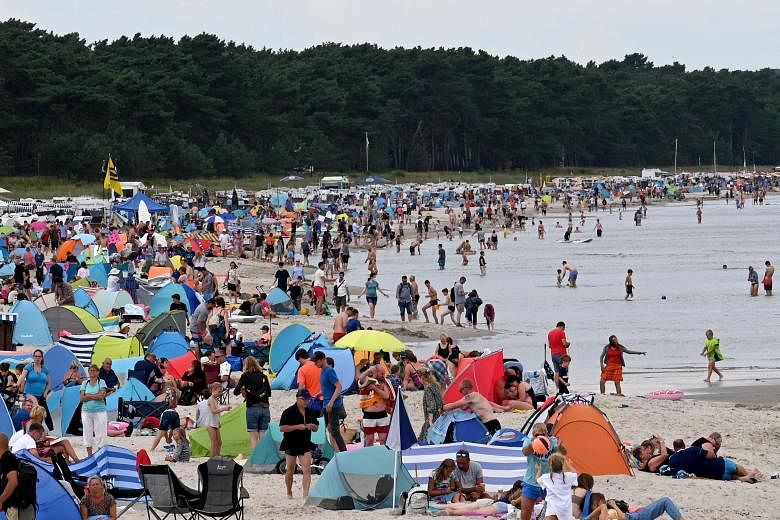
SINGAPORE - Singapore's plan to pilot leisure travel for those vaccinated against Covid-19 - starting with Germany - has given cheer to travel-starved residents who have been kept at home by the coronavirus pandemic for more than a year.
The quarantine-free travel lanes for vaccinated passengers going to and coming from Germany and Brunei from Sept 8 will be closely watched by the rest of the world to glean lessons from the successes - or missteps - of Singapore's calibrated reopening.
Following the announcement of the Vaccinated Travel Lane (VTL) scheme on Thursday (Aug 19), Germany shot up among trending topics on Twitter and "Germany Covid cases" became one of the top 20 Google searches in Singapore.
"It is remarkable how the VTL has also brought Singapore into the news in Germany," Dr Norbert Riedel, German Ambassador to Singapore, told The Straits Times.
"My fellow Germans have a very positive image of Singapore and the achievements of its people, and I am sure that Singaporeans will be welcomed with an open mind and cheerful spirit."
He added: "Singapore remains the hub to the Asean region and thus an essential entry point for the EU (European Union). Both organisations depend on connectivity and trade in order to move successfully into the post-pandemic world."
While Singaporeans are excited at the prospect of being able to travel again, they are also concerned about whether it is sufficiently safe and worth the risks and hassle of Covid-19 testing.
ST lays out the facts and feedback from the ground to help you make an informed travel decision.
Virus situation
Nearly 60 per cent of the German population have been fully vaccinated against Covid-19 with shots from Pfizer-BioNTech, Moderna, Johnson & Johnson or Oxford-AstraZeneca.
Dr Riedel stressed that Germany's strategy towards containing the coronavirus and learning to live with it is aligned with Singapore's own policies.
"In its fight against Covid-19, Germany follows the very same path as Singapore: Vaccination is key," he said. "We have yet to reach Singapore's extraordinary level. But at 60 per cent and growing, I see Germany well-prepared to welcome visitors from abroad in a safe environment."
The ambassador said Germany is experiencing an increase in infections, albeit "at a low level". But this has not been accompanied by rising hospitalisations, which is "an encouraging sign that we are on the right track for the new normal".
"In terms of virus precautions, Singaporeans will face a setting similar to back at home," he added.
Germany's seven-day moving average of new Covid-19 infections stood at around 6,200 on Friday. This was about 49 cases per 100,000 people, up from 25 a week earlier, according to the Robert Koch Institute (RKI), the nation's disease control agency.
There are wide regional differences, though, given the country's vast land mass. For example, the western state of North Rhine-Westphalia had an infection rate of 83 cases per 100,000 people, while rates in the central states of Thuringia and Saxony-Anhalt were below 13.
Only 2.8 per cent of beds in Germany's intensive care units were being occupied by Covid-19 patients, the RKI said. Overall death rate from the disease is fairly low, too, at around 2.4 per cent.
Germany boasts some 2,000 hospitals, with its best - the Heidelberg University Hospital - ranking 22nd in the world. The cost of in-patient treatment for each hospital case was €5,088 (S$8,100) on average, the Federal Statistical Office said this year, referencing data from 2019.
Since Germany's first Covid-19 case was confirmed in Munich in Jan 27, 2020, it has seen more than 3.8 million infections, and nearly 92,000 deaths, overwhelmingly among elderly people above 70.
Enforcing rules
Virus containment measures may differ from state to state, with the authorities regularly reviewing the outbreak situation in each area. The benchmark for imposing restrictions on public and social life was 100 cases per 100,000 people, but other factors - including hospital admission rates - are now also being taken into account.
More recently, uniform nationwide rules were introduced, known as the "3G" health pass system. Essentially, they require people to show proof that they have been vaccinated or tested or have recovered from the virus ("geimpft, getestet oder genesen" in German) to gain entry into many public venues, such as restaurants, theatres, salons, gyms and churches.
Germany is also ending free Covid-19 testing for most in October to incentivise more people to get inoculated. But children, as well as people who for health reasons cannot be vaccinated, can still get tested for free.
Similar to Singapore's requirements, face masks must be worn indoors, on public transport and in crowded outdoor spaces. But Germany has stricter mask requirements - only surgical, N95, KN95 or FFP2 masks are allowed. These are typically readily available in pharmacies, supermarkets and general stores.
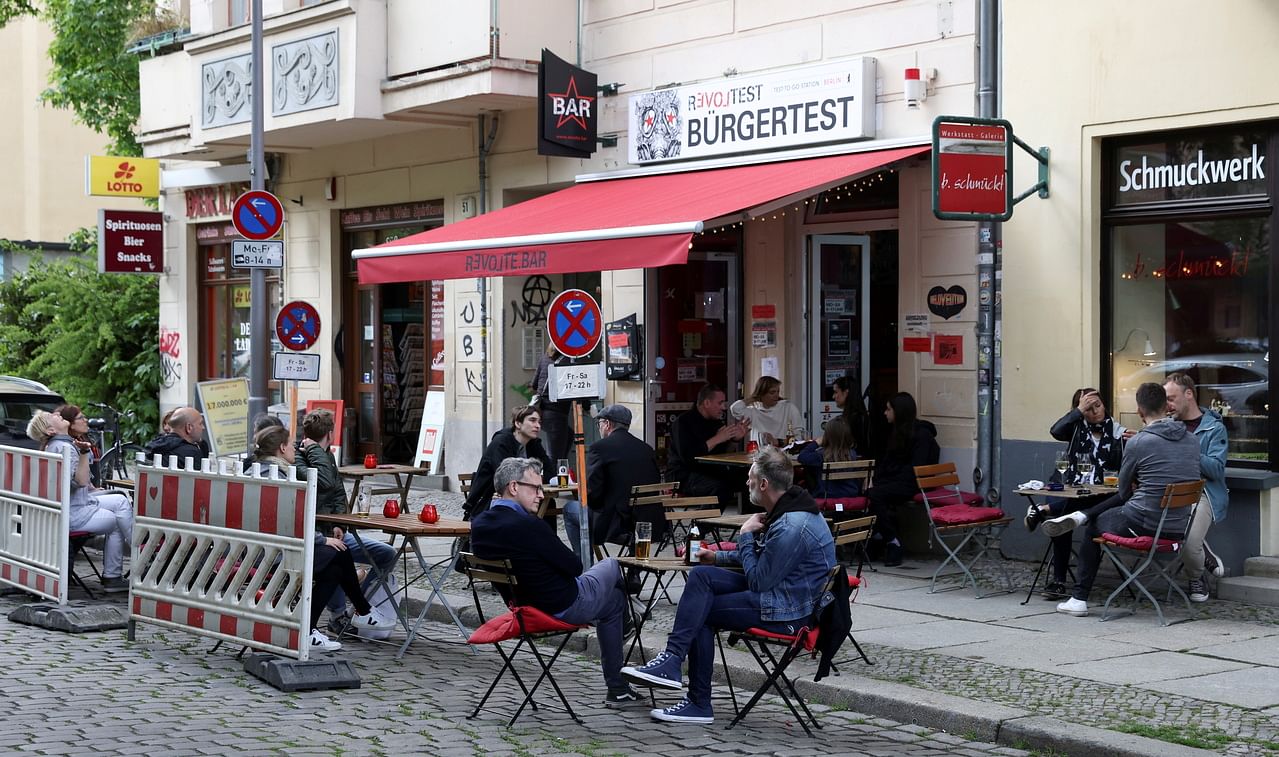
Penalties for not being appropriately masked or maintaining social distancing differ among states. Offenders typically face fines ranging from €50 to €250.
There is digitised contact tracing, too, with the RKI issuing an official open-source app, called the Corona-Warn-App.
Ground sentiment
"I feel that Germany has managed Covid-19 well compared with other European countries; it's obvious by just looking at the numbers," said Singaporean Leeza Yeo, 50, a culinary instructor who lives with her German husband in Frankfurt.
"I feel safe. Covid-19 here seems under control. Germans are very disciplined people who abide by the rules, not that different from Singaporeans."
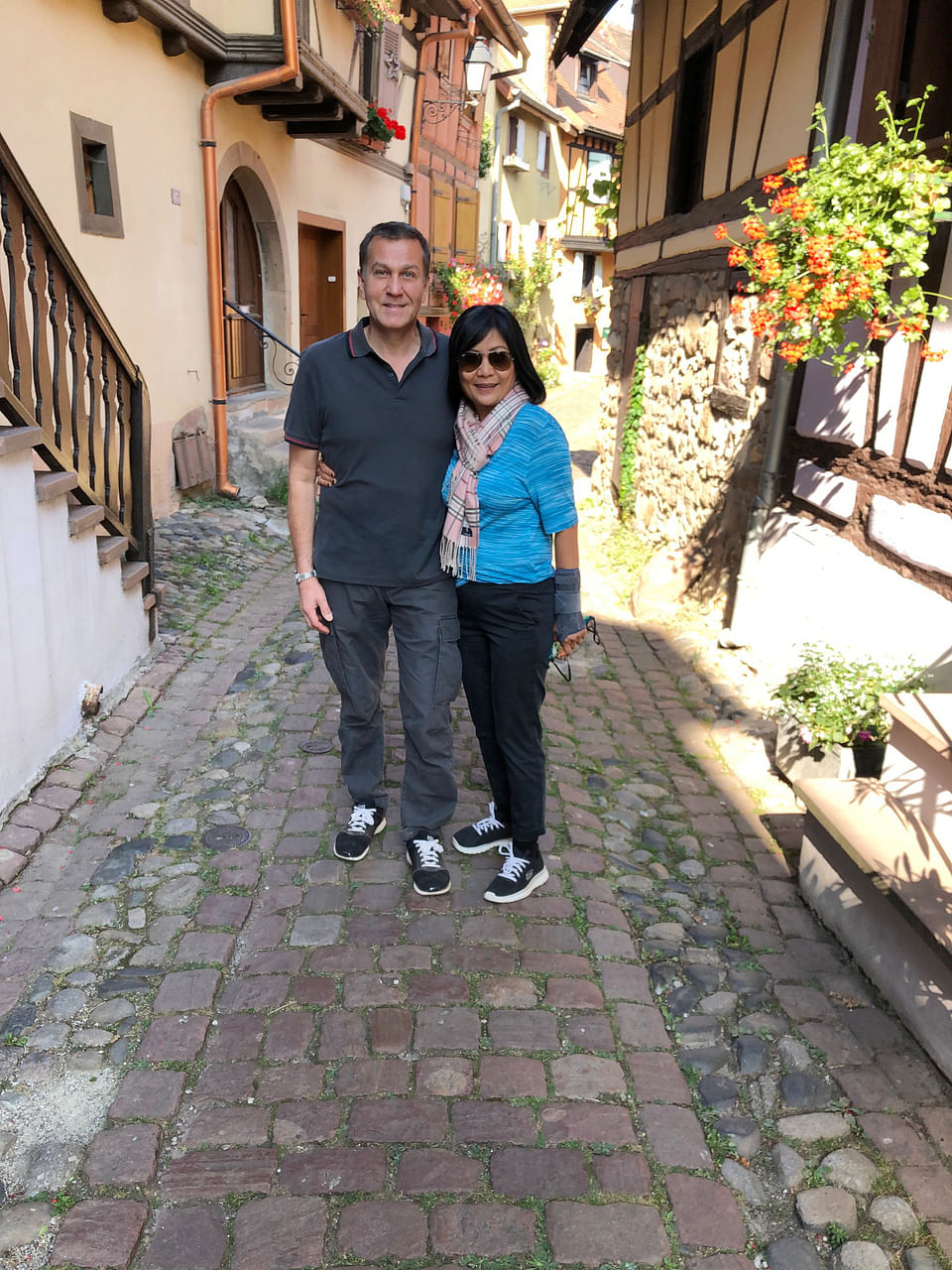
Ms Andriana Ngaman, a teacher at an international school teacher and also a Singaporean, said that Covid-19 restrictions are largely accepted by society, though there are still the occasional demonstrations by those who do not agree with the government's policies.
"Police presence has been stepped up to ensure requirements are adhered to," said Ms Andriana, 46, who lives in Heidelberg with her German husband and two young children. "Not wearing a mask or not following social distancing measures seem to rarely be a reason for police involvement, though."

Another Singaporean, Ms Sim Chi Yin, found the rising number of recent Covid-19 infections around the world, including in Germany, "quite worrying".
"Overall, measures here are much more relaxed than in Singapore… There's a different attitude about it here: It's more about living with a pervasive virus," said Ms Sim, 42, an artist who lives in Berlin with her Canadian husband and toddler son. "We try to be outdoors mostly if we go out, and we have our own hand-washing and sanitising rules at home."
She added: "I think, in the end, we will have to learn to live with this virus and adapt to having it in our lives. Time cannot keep standing still."
Delight, relief
Most Singaporeans living in Germany expressed delight and relief that they can finally return home or have their loved ones visit without having to serve out a lengthy quarantine. There are more than 2,000 Singaporeans living in Germany.
"It's great news! I save not only on the cost of SHN (stay-home notice) at dedicated hotel premises, but also the 14 days' quarantine time," said freelance writer Cindy Tong, 44, who lives with her German husband in Stuttgart.
"It is difficult for us to visit Singapore for more than a week each time, so every day counts… But with this new travel lane, a short trip back home can be something we can look forward to again."
Ms Yeo, the culinary instructor, said she was "thrilled and thankful". She is planning to fly back to Singapore on Sept 15 with some of her German friends.
Ms Andriana, the teacher, is glad but said she was unlikely to use the VTL as her two children, aged nine and 11, are not vaccinated. Germany offers vaccinations for children aged at least 12.
"I might come alone," she said. "But it won't be cheap due to the cost of the four PCR (polymerase chain reaction) tests required, the hotel I would have to pay for while waiting for a negative result, and the special VTL flights."
A PCR test in Singapore costs $160, according to the Immigration and Checkpoints Authority.
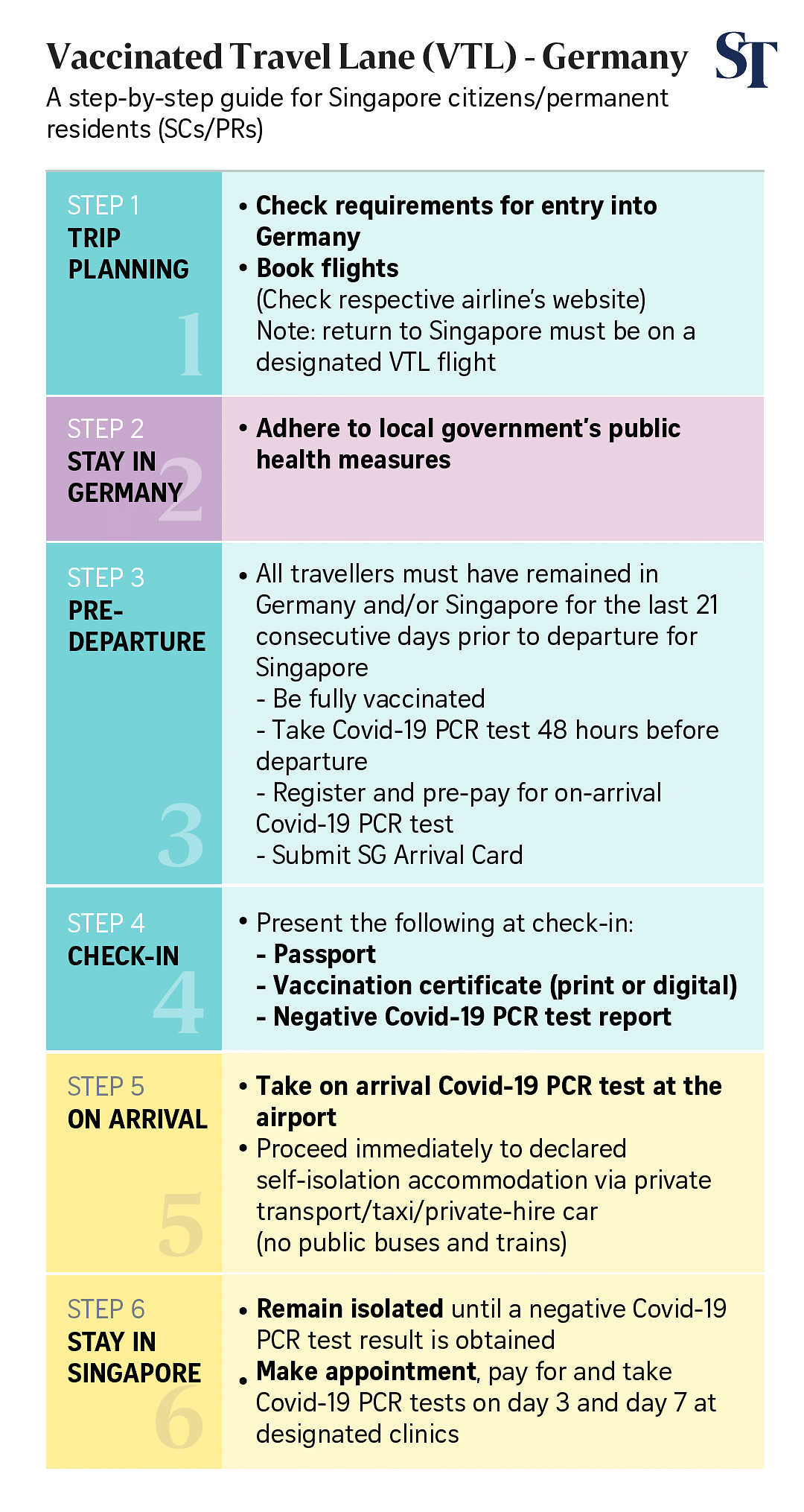
Singaporeans whom ST spoke to said they found the initial German response to Covid-19 "a bit slow" compared with what they were used to in Singapore. But they agreed that the situation improved rapidly once the general populace started taking it more seriously.
"The Germans have massive resources at their disposal compared with their neighbours, and so could tide over this period somewhat better than most other countries," said Mr Mark Cai, 33, a management consultant in Frankfurt.
"Speed and coherency in Germany's policymaking can sometimes be lacking, because it's not always easy for the federal government of the different states to reach consensus."
Border controls
"It's easy to be critical, especially when comparing Germany with Singapore and how swiftly we responded," Ms Tong, the freelance writer, said. "But we're also much smaller and we don't have open borders. The Schengen area makes enforcement so much more difficult."
The 26 European countries in the Schengen area have removed all border controls to ensure the free movement of their people within it. Germany currently institutes compulsory quarantine for travellers from some Schengen regions with higher risk for infection, including parts of Greece, France and Spain.

Relating her experience travelling to the Italian Alps with her husband this month, Ms Tong said: "There was no inspection at all. Perhaps they only do random checks. We just zipped past the border into Austria, then into Italy. And the tourist areas around Lake Garda in Italy were crawling with people, all maskless."
Ms Tong's observations raise concerns that without rigorous border checks, people who travel outside Germany could get infected and then pass the virus to tourists within the country.
But requiring that all passengers in the new quarantine-free travel lane between Singapore and Germany be fully vaccinated significantly lowers the likelihood of travellers falling severely ill even if they do catch the virus.
The strict testing regimen before leaving Germany and upon arrival in Singapore also minimises the risks of having Covid-19 slip through the borders undetected.
Moreover, passengers utilising the VTL must have remained only in Germany or Singapore for the last 21 days. That is, visiting other countries in the three weeks during one's stay in Germany would disqualify them from quarantine exemption upon their return to Singapore.
Some Germans are sharing Singaporeans' excitement over the new travel lane.
"Singapore is definitely a more attractive travel option for me now," said German entrepreneur Florian Balke, 34. "Singapore has great standing among German tourists as a safe and clean destination."

"China, Taiwan and Singapore are on my travel bucket list as some of the people I work with are located there, and it's important for me to have a chance to meet them face to face at least once," added Mr Balke, who runs a production company as well as a ramen restaurant in Berlin.
For Singaporeans planning to visit Germany, Ambassador Riedel has some holiday tips: "With cycling having become a popular hobby in Singapore during the pandemic, exploring Germany by bike would be an interesting option.
"There's so much to discover, with nearly 50 Unesco World Cultural Heritage sites as well as opportunities to get to know some of our lesser-known cities."
Join ST's WhatsApp Channel and get the latest news and must-reads.
- Travel and leisure
- Coronavirus
- Vaccinated Travel Lane/VTL
Read 3 articles and stand to win rewards
Spin the wheel now


Netflix users celebrate as 2023 ‘masterpiece’ finally debuts online
Many are calling it ‘the greatest movie ever made’
11 best affordable Orchard Road eats so you’ll have more money for retail therapy
The post 11 best affordable Orchard Road eats so you’ll have more money for retail therapy appeared first on SETHLUI.com.
Harper Beckham's 90s outfit with David has a hidden £2K twist
Harper Beckham looked lovely watching the football on dad David's Instagram, wearing a simple pink T-shirt. Victoria Beckham's daughter carried a Bottega Veneta 'Jodie' bag which costs £2,200.
Jenna Ortega shocks fans by officially departing hit Netflix series
Viewers have called the revelation ‘crazy’ and ‘devastating’
Transfer news LIVE! Arsenal target price slashed; Chelsea and Spurs eye Muniz; Mbappe done, Man Utd latest
All the latest news, rumours, gossip and deals as the summer window approaches
The Nasty Reason Why You May Want To Stop Ordering These 3 Popular Beverages While Flying
It turns out there are a few items you might want to avoid... and for a gross reason.
Woman Who Dated Serial Killer Realized Later He Was Drugging Her Repeatedly: 'Oh My God, I Can't Wake Up'
Sherry Hopson had no idea Bruce Lindahl was a serial killer, but she did notice dangerous red flags
5 Singapore Stocks Paying Out Dividends in June
Here are five Singapore stocks that are dishing out dividends this month. The post 5 Singapore Stocks Paying Out Dividends in June appeared first on The Smart Investor.
Meghan Markle throws Prince Archie up in the air in sweet home video
The Duchess of Sussex is seen throwing her son Prince Archie up in the air in a sweet home video from the Netflix documentary, Harry & Meghan
I'm an American who ate at KFC in Japan. The dishes I tried blew away the chain's US offerings.
Kentucky Fried Chicken (KFC) is incredibly popular in Japan and its locations and offerings here are much better than the ones in the US.
I’m an Economist: Here Are My Predictions for Inflation If Trump Wins
The 2024 election will be here before you know it, and economists are watching it closely. If Donald Trump wins a second term, some experts believe it could affect the trajectory of inflation in the...
Stormy Daniels breaks her media silence and says Melania should leave Donald Trump
"Not because of what he did with me or other women but because he is a convicted felon," Daniels told The Mirror.
Where did this popular stall with Jumbo Wanton Mee disappear to?
The post Where did this popular stall with Jumbo Wanton Mee disappear to? appeared first on SETHLUI.com.
Top 1 Home Made Noodle: Super shiok fully customisable QQ ban mian & tom yum mee
The post Top 1 Home Made Noodle: Super shiok fully customisable QQ ban mian & tom yum mee appeared first on SETHLUI.com.
Leigh-Anne Pinnock rocks nearly naked trend in lace micro skirt and plaited bikini
Leigh-Anne Pinnock has shared some new pics on Instagram - one of which includes her nailing the nearly naked trend in a lace micro skirt and plaited bikini.
It looks like you have JavaScript disabled. That's OK! All the content on the site is still viewable, but keep in mind most of the interactive features won't work.
Current information for travelers
The Ordinance on Coronavirus Entry Regulations (Coronavirus-Einreiseverordnung – CoronaEinreiseV) regulates a uniform, nation-wide obligation to test, quarantine and furnish proof, as well as a ban on carriage from areas of variants of concern. The goal of the Ordinance on Coronavirus Entry Regulations is to reduce the risk of infection with the SARS-CoV-2 coronavirus, since travel movements and border traffic can introduce infections and lead to new hot spots of infection.
The Ordinance on Coronavirus Entry Regulations ( CoronaEinreiseV ) expires on 7 April 2023. After that date, entry into Germany will again be possible without coronavirus-related entry restrictions while observing the general entry requirements under the law of residence and relating to the border police (information from the Federal Ministry of the Interior " Lifting of COVID-19-related restrictions ").
CoronaEinreiseV - Overview and download of all versions of the regulation (German)
Last change: 7. April 2023
- RSS Newsfeed
- ASSOCIATIONS
- CLIMATE CHANGE
- TRAVEL COMPANIES
- ASIA PACIFIC
- MIDDLE EAST
- NORTH AMERICA
- PHILIPPINES
- BANYAN TREE
- NORWEGIAN CRUISE LINE
- PANDAW CRUISES
- PRINCESS CRUISES
- ROYAL CLIFF
- THAI AIRWAYS
- WORLDHOTELS
- TRAVEL DEALS

Vistara boosts flights to Europe
SalamAir readies for Delhi flights
Honouring muslim-friendly tourism, malaysia steps up sales at itb china.
Chance to win a Dusit Stay
Emirates and Viva Aerobus ink interline pact
Summer deals with My Emirates Pass
BWH extends its Middle East footprint
Time is running out to tap Club Med discount
MOVE flags lowest fares for members
CX peps up rewards when visiting Thailand
Doesn’t get better than a THB100 fare
Thai Vietjet makes Songkran fare splash
More Indians take a break in Thailand
Airline bookings to europe soar.
Steam trains clickety-clack for tourism
Steady recovery for airline connectivity
Japan tops trending list
Smog and dams a threat to tourism?
Sailing on calmer waters
Is the global travel industry isolating Russia?
Will China reopen outbound travel soon?
Agoda clarifies reviewer privacy rules
Germany tightens rules for Singaporeans
BERLIN, 25 October 2021: German authorities have tightened entry restrictions for travellers from five more countries, and despite enjoying special vaccinated travel lane status, Singapore is on the list.
Based on Robert Koch Institute input, Germany added Bulgaria, Cameroon, Croatia, Congo and Singapore to an update of high-risk countries and regions.
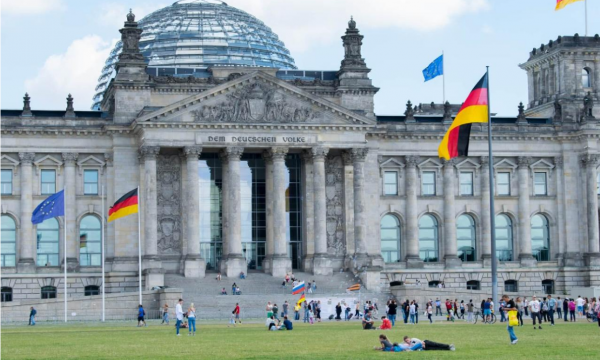
RKI is the government institute responsible for disease prevention and control.
The decision, which was announced on Friday, 22 October, will become effective Sunday, 31 October. It means that travellers from these countries are now subject to more entry restrictions than before, including the obligation to register before their trip to Germany at einreiseanmeldung.de.
At the same time, travellers from the five countries, including Singapore, will have to self-isolate for 10 days upon arrival in Germany. If the traveller can provide proof of vaccination with one of the vaccines accepted by the German authorities, or recovery from Covid-19 in the last six months, then the isolation can be ended prematurely.
For travellers who aren’t vaccinated (or their vaccination is not valid in Germany) and those who have been infected with Covid-19 in the last months, they can still end quarantine prematurely by testing for Covid-19, though not immediately.
“The quarantine period may be ended on the basis of a negative test carried out no earlier than five days after entry,” explains the German Foreign Office statement.
Data published by the World Health Organization show that the newly reported cases in the last seven days per 100,000 population per Croatia, Singapore, and Bulgaria was higher than 300 (327.27, 396.42, and 344.5 respectively) , while for Germany the rate stood at 90.26.
RKI delisted four countries – Honduras, Iraq, Kenya, and Kosovo – effective 24 October. Travellers from these countries can enter Germany under facilitated entry restrictions.
In the 15 October update, Algeria, Fiji, Morocco, Sri Lanka, and Tunisia were also removed from Germany’s list of high-risk areas due to the drop in Covid-19 cases in their territory recently. Prior to that, the RKI had added Estonia, Latvia, Brunei Darussalam, Ukraine, and Yemen to the list.
(Source: Schengenvisainfo)
See: https://www.schengenvisainfo.com/news/germany-travel-restrictions-tighten-up-for-arrivals-from-bulgaria-croatia-singapore-cameroon-congo/
RELATED ARTICLES
One bangkok brings back japan’s isetan brand, finnish restaurants score more stars.

- Category United States
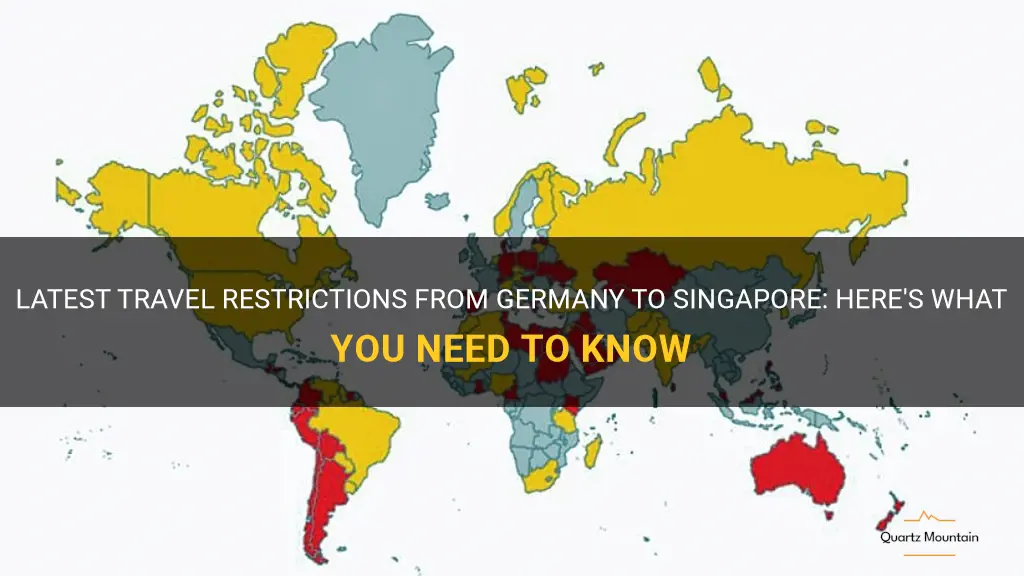
In recent years, the world has become increasingly interconnected, with travel opportunities that were once unimaginable now just a plane ride away. However, in the wake of the global pandemic, the dynamic nature of international travel has been drastically altered. One such example is the travel restrictions imposed on those wishing to travel from Germany to Singapore. These restrictions, put in place to curb the spread of the virus, not only highlight the importance of safety in the midst of this unprecedented situation, but also serve as a reminder of the immense value that travel holds within our lives.
What You'll Learn
What are the current travel restrictions for individuals traveling from germany to singapore, are there any exemptions or special circumstances where travel from germany to singapore is permitted, are there any quarantine or testing requirements for individuals arriving from germany to singapore, are there any specific entry requirements or documentation that travelers from germany need to provide when entering singapore, are there any updates or changes in the travel restrictions from germany to singapore expected in the near future.

In response to the global COVID-19 pandemic, many countries, including Singapore, have implemented travel restrictions to control the spread of the virus. If you are planning to travel from Germany to Singapore, it is important to be aware of the current travel restrictions in place.
As of now, Singapore has implemented several measures for individuals traveling from Germany. These measures are subject to change based on the evolving situation, so it is crucial to stay updated with the latest information from the relevant authorities.
Here are the current travel restrictions for individuals traveling from Germany to Singapore:
- Pre-Departure Requirements: Before traveling, individuals are required to take a COVID-19 Polymerase Chain Reaction (PCR) test within 72 hours before their scheduled departure. The test must be conducted at recognized laboratories and the result should be negative. The test result must be presented upon arrival in Singapore.
- Health Declaration and Travel Insurance: Travelers are required to submit an electronic Health Declaration Card online before departing from Germany. Additionally, it is recommended to have valid travel insurance to cover any potential medical expenses related to COVID-19.
- Entry Approval: All travelers, including Singapore citizens, permanent residents, and long-term pass holders, must obtain approval for entry into Singapore. This can be done through the relevant government agencies or the SafeTravel website.
- Stay-Home Notice (SHN): Upon arrival in Singapore, travelers from Germany are required to undergo a 14-day SHN at a dedicated facility or their place of residence. During this period, individuals are not allowed to leave their designated location and must adhere to the SHN requirements.
- COVID-19 Testing: Travelers may be subjected to a COVID-19 test upon arrival in Singapore. This is part of the measures to detect and prevent the spread of the virus. The test may be conducted either at the airport or during the SHN period.
It is important to note that these travel restrictions are subject to change, and individuals should check for updates from official sources such as the Ministry of Health in Singapore and the respective embassies or consulates before making any travel arrangements.
In conclusion, individuals traveling from Germany to Singapore are currently subject to various travel restrictions due to the COVID-19 pandemic. These restrictions include pre-departure testing, entry approval, and a 14-day stay-home notice. It is crucial to stay informed about the latest requirements and guidelines to ensure a smooth and safe journey.
The Unforeseen Consequences: Disadvantages of Travel Restrictions
You may want to see also
As the world continues to grapple with the ongoing COVID-19 pandemic, many countries have implemented strict travel restrictions to help mitigate the spread of the virus. Singapore, known for its efficient healthcare system and proactive approach to handling the pandemic, is no exception. However, there are certain exemptions and special circumstances where travel from Germany to Singapore is permitted.
Firstly, individuals who hold a valid long-term pass in Singapore may be allowed to enter the country. This includes individuals with work passes, student passes, and dependent passes. Such individuals may be subject to additional testing and quarantine measures upon arrival.
In addition, Singapore has implemented a Safe Travel Lane (STL) arrangement, which allows for limited travel between Singapore and selected countries, including Germany. Under the STL, eligible travelers are required to adhere to strict health and safety protocols, including pre-departure testing, testing upon arrival, and a stay at a designated quarantine facility for a designated period. This arrangement is primarily aimed at facilitating essential business and official travel.
Another exemption applies to individuals who have been fully vaccinated against COVID-19. Singapore has recently announced that travelers who have completed the full vaccination regimen with vaccines approved by the Health Sciences Authority (HSA) in Singapore are exempt from the mandatory quarantine. However, they are still required to undergo a COVID-19 test upon arrival.
It is important to note that the travel restrictions and exemptions may change over time, depending on the prevailing COVID-19 situation. Therefore, it is advisable to check the latest travel advisories and requirements before making any travel plans.
To summarize, while travel restrictions between Germany and Singapore remain in place, there are several exemptions and special circumstances where travel is permitted. These include individuals with valid long-term passes, travelers under the Safe Travel Lane arrangement, and vaccinated individuals. However, it is vital to keep up-to-date with the latest travel advisories and requirements, as these may change in response to the evolving COVID-19 situation.
Navigating Pregnancy Travel Restrictions: What You Need to Know If You're Expecting Twins
As of May 2021, there are quarantine and testing requirements for individuals arriving from Germany to Singapore. The Singaporean government has implemented strict measures to prevent the spread of COVID-19 and ensure the safety of its residents.
Upon arrival in Singapore, travelers from Germany are required to undergo a COVID-19 test at the airport. This test is usually done using a polymerase chain reaction (PCR) test, which detects the presence of the virus in the body. It is a painless procedure that involves taking a swab from the nose and throat.
After the test, travelers are required to proceed to their declared self-isolation location, typically their place of residence or a dedicated isolation facility. They must remain in isolation until they receive a negative test result. The isolation period usually lasts for 14 days, although it may be shorter for vaccinated individuals or those with a negative pre-departure test result.
During the isolation period, individuals are not allowed to leave their designated location unless given permission by the government. They are also required to download and activate the TraceTogether app, which helps with contact tracing efforts in case of any potential exposure to the virus.
In addition to the testing and quarantine requirements, travelers from Germany are also required to submit a health declaration form and a travel history declaration form. These forms provide information about the traveler's health status and recent travel history, which is crucial for contact tracing purposes.
It is important to note that these requirements are subject to change and may vary depending on the evolving situation with the pandemic. Travelers are advised to check the latest information and guidelines provided by the Singaporean government and relevant authorities before their departure.
Overall, the quarantine and testing requirements for individuals arriving from Germany to Singapore aim to control the spread of COVID-19 and protect the health and well-being of the local population. By following these measures diligently, we can all contribute to the ongoing efforts to overcome the pandemic.
Exploring the Latest Travel Restrictions in Portugal
Yes, travelers from Germany, like travelers from all other countries, are required to fulfill certain entry requirements and provide specific documentation when entering Singapore. These requirements and documentation are in place to ensure the safety and security of the country and its residents.
First and foremost, travelers from Germany must possess a valid passport with at least six months validity beyond the intended stay in Singapore. This is a standard requirement for entry into most countries and is also applicable to travelers from Germany. It is important to ensure that your passport is not damaged or expired before making your travel arrangements.
In addition to a valid passport, travelers from Germany must also have a visa to enter Singapore. However, Germany is one of the many countries whose citizens are eligible for the Visa-Free Transit Facility (VFTF) or Visa-Free Transit Facility (FTF). This means that if you are transiting through Singapore on your way to another country and your transit period is less than 96 hours, you do not need a visa.
If you are planning to stay in Singapore for a longer duration, you will need to apply for a visa. The type of visa you need will depend on the purpose of your visit. Singapore offers various types of visas, such as a tourist visa, business visa, and student visa, among others.
To apply for a visa, travelers from Germany will need to provide certain documents, such as a completed visa application form, a recent passport-sized photograph, a copy of the bio-data page of your passport, proof of travel arrangements, and proof of sufficient funds to cover your stay in Singapore. It is important to check the specific requirements for the type of visa you are applying for on the Singapore Immigration and Checkpoints Authority (ICA) website.
In addition to the passport and visa requirements, travelers from Germany may also be subject to health screening upon arrival in Singapore. This is especially relevant during times of public health emergencies, such as the COVID-19 pandemic. Travelers may be required to undergo temperature checks, fill out health declaration forms, and undergo testing for COVID-19.
It is important to note that entry requirements and documentation may change from time to time, depending on various factors, including the current global situation. Therefore, it is always advisable to check the latest information and regulations on the official websites of the Singapore government or consult with the relevant authorities.
In conclusion, travelers from Germany, like travelers from all other countries, are required to fulfill certain entry requirements and provide specific documentation when entering Singapore. This includes having a valid passport, obtaining the necessary visa if required, and potentially undergoing health screening upon arrival. It is important to stay updated on the latest requirements and regulations to ensure a smooth entry into Singapore.
Navigating the Travel Restrictions in Cavite: What You Need to Know
As the global pandemic continues to affect travel plans and restrictions around the world, many people are wondering about the current and future travel restrictions from Germany to Singapore. While it is always important to stay informed and up-to-date on the latest developments, at the time of writing, there have not been any official announcements regarding changes or updates to the travel restrictions between Germany and Singapore.
However, it is essential to keep in mind that these restrictions can change rapidly, depending on the current situation and government policies. It is crucial to regularly check official government websites, such as the German Foreign Office and the Singapore Ministry of Health, for the most accurate and up-to-date information.
Currently, there are existing travel restrictions in place for individuals traveling from Germany to Singapore. These restrictions include mandatory quarantine periods and pre-departure and arrival requirements, such as COVID-19 testing and health declarations. These measures are implemented to ensure the safety and well-being of both residents and visitors in Singapore.
To give an idea of the current travel restrictions, individuals entering Singapore from Germany need to adhere to several requirements. Before departure, travelers must obtain a negative COVID-19 PCR test result within 72 hours of their scheduled departure. They are also required to complete an electronic Health Declaration Card and submit it to the Immigration and Checkpoints Authority (ICA). Additionally, travelers will be subject to a mandatory 14-day quarantine period upon arrival, which must be served at dedicated facilities and at their own expense.
It is also worth noting that these restrictions and requirements may change depending on the prevailing COVID-19 situation. As countries strive to mitigate the spread of the virus and protect their citizens, travel restrictions can be tightened or relaxed accordingly. Governments closely monitor the epidemiological situation and adjust their policies as necessary, which means that travel restrictions can be updated at any time.
For travelers planning to visit Singapore from Germany in the near future, it is crucial to stay informed and be prepared for any potential changes. Regularly check official government websites and travel advisories for the latest updates and guidance. It is also advisable to consult with travel agencies or airlines for the most accurate and up-to-date information regarding travel restrictions and requirements.
In conclusion, while there are no specific updates or changes in the travel restrictions from Germany to Singapore at the moment, it is important to stay informed and prepared for any potential developments. As the situation surrounding the global pandemic continues to evolve, governments may implement new measures or adjust existing restrictions to safeguard public health. Travelers must stay up-to-date on the latest information and follow any guidelines or requirements to ensure a safe and smooth journey.
An Overview of Travel Restrictions in Dallas: What You Need to Know
Frequently asked questions.
As of now, traveling from Germany to Singapore is restricted due to the ongoing COVID-19 pandemic. Only certain categories of travelers are allowed into Singapore, such as Singapore citizens, permanent residents, and work permit holders. Tourists from Germany are not currently permitted to enter Singapore unless they have obtained special permission.
Yes, all travelers entering Singapore from Germany are required to undergo a 14-day quarantine period upon arrival. The quarantine must be completed at a designated facility, such as a government-approved hotel or a dedicated Stay-Home Notice (SHN) facility. The cost of the quarantine is to be borne by the traveler.
In addition to the quarantine requirement, travelers from Germany must also adhere to certain pre-departure measures. This includes taking a COVID-19 PCR test within 72 hours before departing for Singapore, as well as submitting a health declaration form and obtaining a negative test result before boarding their flight. It is important to check the latest travel advisories and requirements before making any travel arrangements.

- Leki Bora Author

- Naim Haliti Author Editor Reviewer Traveller
It is awesome. Thank you for your feedback!
We are sorry. Plesae let us know what went wrong?
We will update our content. Thank you for your feedback!
Leave a comment
United states photos, related posts.

12 Exciting Things to Do in Pembroke Pines this Weekend
- Jun 17, 2023
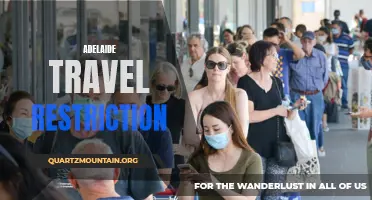
Exploring Adelaide amidst Travel Restrictions: 5 things to know before you visit
- Aug 03, 2023

12 Awesome Activities in Carlinville, IL
- May 22, 2023

13 Free Things to Do in Oceanside: From Beaches to Historic Sites
- May 16, 2023

The Ultimate Packing Guide for Your Joshua Tree Adventure
- Dec 25, 2023

13 Fun and Exciting Things to Do in Port St Joe
- May 07, 2023
Security Alert May 17, 2024
Worldwide caution, update may 10, 2024, information for u.s. citizens in the middle east.
- Travel Advisories |
- Contact Us |
- MyTravelGov |
Find U.S. Embassies & Consulates
Travel.state.gov, congressional liaison, special issuance agency, u.s. passports, international travel, intercountry adoption, international parental child abduction, records and authentications, popular links, travel advisories, mytravelgov, stay connected, legal resources, legal information, info for u.s. law enforcement, replace or certify documents.
Before You Go
Learn About Your Destination
While Abroad
Emergencies
Share this page:
Travel Advisory May 1, 2024
Germany - level 2: exercise increased caution.
Reissued after periodic review with minor edits
Exercise increased caution in Germany due to terrorism .
Country Summary: Terrorist groups keep planning attacks in Germany. Terrorists may attack with little or no warning. They target tourist locations and transportation hubs. They also target markets/shopping malls and local government facilities. They target hotels, clubs, and restaurants. They also attack places of worship, parks, and major sporting and cultural events. They target schools, airports, and other public areas.
Read the country information page for additional information on travel to Germany.
If you decide to travel to Germany:
- Be aware of your surroundings when traveling to tourist locations and crowded public venues.
- Follow the instructions of local authorities.
- Monitor local media for breaking events and adjust your plans based on new information.
- Enroll in the Smart Traveler Enrollment Program ( STEP ) to receive Alerts and make it easier to locate you in an emergency.
- Follow the Department of State on Facebook and Twitter .
- Review the Country Security Report for Germany.
- Visit the CDC page for the latest Travel Health Information related to your travel.
- Prepare a contingency plan for emergency situations. Review the Traveler’s Checklist .
Embassy Messages
View Alerts and Messages Archive
Quick Facts
Three months beyond planned date of departure from the Schengen area.
Not required for stays under 90 days.
10,000€ (euros or equivalent).
Embassies and Consulates
U.S. EMBASSY BERLIN Clayallee 170 14191 Berlin Federal Republic of Germany Telephone: +(49) (30) 8305-0 Emergency After-Hours Telephone: +(49) (30) 8305-0 Fax: +(49) (30) 8305-1050 Email: [email protected]
U.S. CONSULATE GENERAL FRANKFURT Giessener Str. 30 60435 Frankfurt am Main Federal Republic of Germany Telephone: +(49) (69) 7535-0 Fax: +(49) (69) 7535-2252 Passport, Consular Report of Birth Abroad, and Citizenship: [email protected] All other questions: [email protected]
U.S. CONSULATE GENERAL MUNICH Koeniginstrasse 5 80539 Munich Federal Republic of Germany Telephone: +(49) (89) 2888-0 Emergency After-Hours Telephone: +(49) 89-2888-0 Fax: If you need to send a fax, please email first to obtain a one-time use fax number. Email: [email protected]
U.S. CONSULATE GENERAL DUSSELDORF Willi-Becker-Allee 10 40227 Duesseldorf Federal Republic of Germany Telephone: +(49) (69) 7535-0 Emergency After-Hours Telephone: +(49) (30) 8305-0 Fax: +(49) (69) 7535-2252 Consular services are provided through the U.S. Consulate in Frankfurt.
U.S. Consulate General Hamburg Kehrwieder 8 20457 Hamburg Federal Republic of Germany Telephone: +(49) (30) 8305-0 Emergency After-Hours Telephone: Contact the U.S. Embassy in Berlin: +(49) (30) 8305-0 Fax: +(49) (30) 8305-1050 Consular services are provided through the U.S. Embassy in Berlin.
U.S. Consulate General Leipzig Wilhelm-Seyfferth-Str. 4 04107 Leipzig Federal Republic of Germany Telephone: +(49) (30) 8305-0 Emergency After-Hours Telephone: Contact the U.S. Embassy in Berlin: +(49) (30) 8305-0 Fax: +(49) (30) 8305-1050 Consular services are provided through the U.S. Embassy in Berlin.
Destination Description
See the Department of State’s Fact Sheet on Germany for information on U.S. - Germany relations.
Entry, Exit and Visa Requirements
Traveling Through Europe : If you are planning to visit or travel through European countries, you should be familiar with the requirements of the Schengen Agreement.
- In Europe's Schengen area , your passport generally must be valid for at least six months at the time of your entry. Although Germany only requires travelers to have three months of validity remaining beyond their intended departure date, airlines may still deny boarding for having less than six months validity, especially if transiting additional Schengen countries.
- If you plan on transiting a Schengen country, review our U.S. Travelers in Europe page .
- You will need sufficient proof of funds and a return plane ticket .
- For additional information about visas for the Schengen area, see the Schengen Visa page.
- If traveling with prescription medication, review the information below regarding pharmaceuticals to avoid potential fines and confiscation.
Carry identification with you at all times.
The U.S. Department of State is unaware of any HIV/AIDS entry restrictions for visitors to, or foreign residents of, Germany.
Find information on dual nationality , prevention of international child abduction and customs regulations on our websites.
Safety and Security
Terrorism: Credible information indicates terrorist groups continue plotting possible attacks in Europe. European governments are taking action to guard against terrorist attacks; however, all European countries remain potentially vulnerable to attacks from transnational terrorist organizations.
Terrorist groups and those inspired by such organizations are intent on attacking U.S. citizens abroad. Terrorists are increasingly using less sophisticated methods of attack –including knives, firearms, and vehicles – to more effectively target crowds. Frequently, their aim is unprotected or vulnerable targets, such as:
- High-profile public events (sporting contests, political rallies, demonstrations, holiday events, and celebratory gatherings)
- Hotels, clubs, and restaurants frequented by tourists
- Places of worship
- Schools
- Shopping malls and markets
- Public transportation systems (including subways, buses, trains, and scheduled commercial flights)
For more information, see our Terrorism page.
Crime: Violent crime is rare in Germany, but can occur, especially in larger cities or high-risk areas such as on large metropolitan subway systems and in train stations, primarily during late night or early morning hours. Most incidents of street crime involve the theft of unattended items and pickpocketing. Theft and pickpocketing primarily take place at train stations, on public transportation, at tourist attractions, and at large public events. Always pay close attention to your valuables!
Be cautious and aware of your surroundings.
U.S. citizens should exercise caution when congregating in known expatriate hangouts.
Don’t buy counterfeit and pirated goods, even if they are widely available. They are illegal to bring back into the United States, and you could also be breaking local law.
Demonstrations: Demonstrations occur regularly in Germany. Large, public demonstrations take place for a variety of political and economic issues. Demonstrations tend to take place on politically significant holidays like German Labor Day (May 1) and during international summits hosted in Germany. Demonstration organizers must obtain prior police approval, and police routinely oversee participants.
- Demonstrations can be unpredictable; avoid areas around protests and demonstrations.
- Check local media for updates and traffic advisories.
- Strikes may interfere with travel plans. We strongly encourage travelers to check transportation schedule information prior to travel.
International Financial Scams: See the Department of State and the FBI pages for information.
Internet romance and financial scams are prevalent in Germany. Scams are often initiated through Internet postings/profiles or by unsolicited emails and letters. Most scammers pose as U.S. citizens who have no one else to turn to for help.
Tips to avoid scammers:
- Look for red flags like their location is far away, their profile was recently created or seems to be too good to be true, the pace of the relationship is moving too quickly, or they ask for money.
- Set up a phone call/video chat in the initial stages.
- Do a reverse image search on the profile picture.
- If they ask for help, you should refer to them to the closest U.S. Embassy or Consulate so we can work with local authorities to assist.
- If you believe you have been scammed, report the incident to local law enforcement right away and stop all communications with the scammer.
Common scams include:
- Romance/online dating
- Money transfers
- Lucrative sales
- Gold purchase
- Contracts with promises of large commissions
- Grandparent/relative targeting (kidnapping, arrested, medical emergency)
- Free Trip/luggage
- Inheritance notices
- Work permits/job offers
- Bank overpayments
Technology Usage Abroad: Mobiles Devices are vulnerable to compromise, theft, and physical damage anywhere in the world. Best practices prior to traveling abroad are keeping all software (operating system and apps) updated and using virtual private network and encrypted voice over IP (VoIP) applications if possible. Make sure that all VPN/VoIP are reputable, and U.S.-based. Do not connect to unknown open Wi-Fi. GPS Navigation Apps are helpful in getting U.S. citizens around in a foreign country. Prior to using the GPS app, make sure you research the route to make sure it is safe. GPS navigation app may give you the shortest route without safety consideration. Be cautious of using dating apps/online dating websites abroad as U.S. citizens can be targeted by scammers. Make sure to inform your friends and family of your whereabouts, meet at a well-known public location, and not consume suspicious food or drinks. Avoid traveling alone to bars or nightclubs.
Victims of Crime: Report crimes to the local police: in an emergency dial 112 for ambulance and 110 for the police and contact the U.S Embassy or nearest U.S. Consulate (see contact details above).
Remember that local authorities are responsible for investigating and prosecuting crimes.
See our webpage on help for U.S. victims of crime overseas .
We can:
- Help you find appropriate medical care
- Assist you in reporting a crime to the police
- Contact relatives or friends with your written consent
- Provide general information regarding the victim’s role during the local investigation and following its conclusion
- Provide a list of local attorneys
- Provide information on victim’s compensation programs in the United States
- Provide information on victim’s compensation and support in Germany
- Provide an emergency loan for repatriation to the United States and/or limited medical support in cases of destitution
- Help you find accommodation and arrange flights home
- Replace a stolen or lost passport
We also maintain information on our website on how to report child abuse situations to the local authorities.
Domestic Violence: U.S. citizen victims of domestic violence may contact the Embassy or the Consulates General in Frankfurt or Munich for assistance. Call 110 if you are in immediate danger.
Tourism: The tourism industry is generally well regulated, and rules are regularly enforced. Hazardous areas/activities are identified with appropriate signage, and professional staff is typically on hand in support of organized activities.
Germany sometimes experiences extreme weather conditions including floods, long periods of drought, and unusually harsh winters with vast amounts of snow even in urban areas. Numerous injuries and deaths occur every year in Germany’s Alpine and coastal regions. Most of the emergencies relate to the following sports: skiing, hiking, snowboarding, mountain biking, sledding, rock and mountain climbing, paragliding, and swimming. Those engaging in Alpine sports are strongly encouraged to register with German “Alpen Verein.”
In the event of an injury, appropriate medical treatment is widely available throughout the country. Outside of a major metropolitan center, it may take more time for first responders and medical professionals to stabilize a patient and provide life-saving assistance. U.S. citizens are encouraged to purchase medical evacuation insurance. See our webpage for more information on insurance providers for overseas coverage.
Local Laws & Special Circumstances
Criminal Penalties: You are subject to local laws. If you violate local laws, even unknowingly, you may be expelled, arrested, or imprisoned. Individuals establishing a business or practicing a profession that requires additional permits or licensing should seek information from the competent local authorities, prior to practicing or operating a business.
Furthermore, some laws are also prosecutable in the United States, regardless of local law. For examples, see our website on crimes against minors abroad and the Department of Justice website.
Arrest Notification: If you are arrested or detained, ask police or prison officials to notify the U.S. Embassy or nearest U.S. Consulate General immediately. See our webpage for further information.
Special Circumstances: Germany has strict customs regulations concerning:
- Temporary importation or exportation of firearms
- Military artifacts (particularly those of World War II)
- Medications/pharmaceuticals
- Business equipment
Under German law it is also illegal to bring into or take out of Germany any literature, music, or paraphernalia that glorifies fascism, the Nazi past, or the “Third Reich.”
Contact the German Embassy in Washington or one of the German consulates in the United States for specific information regarding customs requirements.
Faith-Based Travelers : See our following webpages for details:
- Faith-Based Travel Information
- International Religious Freedom Report – see country reports
- Human Rights Report – see country reports
- Hajj Fact Sheet for Travelers
- Best Practices for Volunteering Abroad
International Volunteers:
LGBTQI+ Travelers : There are no legal restrictions on same-sex sexual relations or the organization of LGBTQI+ events in Germany. Same-sex marriage is available in Germany. LGBTQI+ persons are protected by federal anti-discrimination laws, and LGBTQI+ Pride events are officially encouraged by most large city governments, including those in Berlin, Cologne, Hamburg, Frankfurt, and Munich.
See our page and section 6 of our Human Rights report for further details.
Travelers with Disabilities: The law in Germany prohibits discrimination against persons with disabilities, and the law is enforced. Social acceptance of persons with disabilities in public is as prevalent as in the United States. Expect accessibility to be limited in some older public transportation, lodging, and general infrastructure, especially outside major cities, but common in most urban infrastructure. Some older buildings and public transportation systems are less adapted to individuals with disabilities.
Check your hotel or destination to learn more about options to accommodate disabled traveler needs before visiting Germany.
The German National Tourist Board maintains information about accessibility and disability-friendly travel .
All German airports and Lufthansa offer services for disabled travelers.
The German National Railway, Deutsche Bahn , maintains a mobility resource webpage.
Students: See our Students Abroad page and FBI travel tips .
Women Travelers: See our travel tips for Women Travelers .
Germany has generally high-quality medical care and facilities. Prescript ion and over-the-counter medicines are widely available although brands and drug names differ from those available in the United States.
For emergency services in Germany, dial 112.
Ambulance services are widely available.
We highly recommend that all travelers review the U.S. Centers for Disease Control and Prevention’s Travelers’ Health webpage and general Traveler Advice for Germany.
- Review all sub-sections including the Travel Health Notices, Vaccines and Medicines, Non-Vaccine-Preventable Diseases, Stay Healthy and Safe, Healthy Travel Packing List, and After Your Trip.
- Reasons for Travel (for example: Adventure Travel, Spring Break Travel)
- Travelers with Special Considerations (for example: Allergies, Long-Term Travelers, and Expatriates)
- General Tips (for example: Traveling with Medications, Travel Vaccines)
The Department of State, U.S. embassies and U.S. consulates general do not pay medical bills. Be aware that U.S. Medicare/Medicaid does not apply overseas. Most hospitals and doctors overseas do not accept U.S. health insurance. If you are not a resident of Germany, doctors and hospitals will expect immediate payment in cash.
Medical Insurance: Make sure your health insurance plan provides coverage overseas or purchase travel insurance for this purpose. Most care providers overseas only accept cash payments. See our webpage for more information on insurance coverage overseas. Visit the U.S. Centers for Disease Control and Prevention for more information on the type of insurance you should consider before you travel overseas.
The Department of State strongly recommends supplemental insurance to cover medical evacuation.
Always carry your prescription medication in original packaging, along with your doctor’s prescription. Check with the German Federal Institute for Drugs and Medical Devices to ensure the medication is legal in Germany. Also read the information below regarding pharmaceuticals and the documentation required to enter Germany with prescription medication.
Vaccinations: Be up to date on all vaccinations recommended by the U.S. Centers for Disease Control and Prevention.
Further health information:
- World Health Organization
- U.S. Centers for Disease Control and Prevention (CDC)
Air Quality: Visit AirNow Department of State for information on air quality at U.S. Embassies and Consulates.
Air quality varies considerably and fluctuates with the seasons. It is typically at its worst in the winter. People at the greatest risk from particle pollution exposure include:
- Infants, children, and teens
- People over 65 years of age
- People with lung disease such as asthma and chronic obstructive pulmonary disease (COPD), which includes chronic bronchitis and emphysema
The U.S. Embassy and Consulates General maintain lists of doctors and medical services in Germany . We do not endorse or recommend any specific medical provider or clinic.
Medical Tourism and Elective Surgery
- Medical tourism is a rapidly growing industry. People seeking health care overseas should understand that medical systems operate differently from those in the United States and are not subject to the same rules and regulations. Anyone interested in traveling for medical purposes should consult with their local physician before traveling and visit the U.S. Centers for Disease Control and Prevention website for more information on Medical Tourism.
- Visit the U.S. Centers for Disease Control and Prevention website for information on Medical Tourism, the risks of medical tourism, and what you can do to prepare before traveling to Germany.
- We strongly recommend supplemental insurance to cover medical evacuation in the event of unforeseen medical complications.
Pharmaceuticals
- If traveling with prescription medication, visit the German customs website to ensure the medication is legal in Germany. For medications that Germany classifies as narcotics, you may only carry a 30-day supply. A comprehensive list of these medications can be found here. If your medication is on that list, there is an additional requirement for your doctor to complete a certification form . You will see part E asks for the endorsement of an “issuing authority.” As there is no such authority in the United States, travelers may have the doctor self-certify the form and enter the information of his or her practice in part E, ideally with a stamp or seal from their office. Due to Germany’s strict customs regulations, you are not allowed to receive prescription medication by mail without special permission. Always carry your prescription.
- Exercise caution when purchasing medication overseas. Medication should be purchased in consultation with a medical professional and from reputable establishments.
- U.S. Customs and Border Protection and the Food and Drug Administration are responsible for rules governing the transport of medication back to the United States. Medication purchased abroad must meet their requirements to be legally brought back into the United States. Medication should be for personal use and must be approved for usage in the United States. Please visit the U.S. Customs and Border Protection and the Food and Drug Administration websites for more information.
Assisted Reproductive Technology and Surrogacy
If you are considering traveling overseas to have a child through use of assisted reproductive technology (ART) or surrogacy, please see our ART and Surrogacy Abroad page .
- All surrogacy arrangements, as well as IVF procedures involving the use of donated eggs, are illegal in Germany. For additional information, see this webpage of the German Foreign Ministry (German language only).
Adventure Travel: Visit the U.S. Centers for Disease Control and Prevention website for more information about Adventure Travel .
Travel and Transportation
Road Conditions and Safety: Road conditions in general are excellent but can differ from those in the United States, but driver error is a leading cause of accidents involving U.S. citizen motorists in Germany.
If you hold a valid U.S. driver’s license, you can drive in Germany for up to six months without acquiring a German driver’s license. Many German traffic laws and traffic signs differ significantly from those in the United States. For more information, please visit the U.S. embassy’s webpage on driving in Germany .
Speed limits are posted on large stretches of the highway, on the Autobahn in urban areas, and when the road has many curves. Although high speeds are permitted on the Autobahn, adverse weather conditions and unfamiliar road markings pose significant hazards. Speed limits are strictly enforced. Use of seat belts is mandatory in front and back seats. Do not park on bike paths or sidewalks. Your vehicle registration, insurance policy, a first-aid kit, a reflective vest, and a reflective triangle must be in your vehicle at all times. In snowy or icy conditions, your vehicle must have snow tires or all-season tires (indicated by M+S marking) or you will be subject to a fine.
Bicycles: German streets and sidewalks have dedicated bike lanes. Bicycles have priority use of bike lanes over pedestrians and automobiles. Bicyclists also have priority over cars when turning onto side streets. If you are driving, check whether a bicyclist is approaching from either direction before attempting to enter side streets, even when the light is in your favor. You will be held responsible for any injury or damage caused if you turn into a side street and hit a bicyclist using a marked bike lane. If you are walking, watch for bicyclists before crossing or stepping into bike lanes.
Traffic Laws: If you are involved in a traffic accident in Germany, even a minor fender-bender, you MUST stay with your vehicle and not leave the scene until police arrive to take a report. It is illegal to use your cell phone while driving in Germany. Except on priority roads, vehicles coming from the right have the right-of-way. It is generally illegal in Germany to pass vehicles on the right. Germans strictly observe the ‘slower traffic keep right’ rule. It is illegal to operate a vehicle if your blood alcohol level is 0.05% or higher. You may be fined, and your driver’s license may be suspended for specified periods of time, depending upon the gravity of each violation.
Public Transportation: Germany has an extensive and safe public transportation network consisting of buses, streetcars, trains, and subways. Metered taxis are also prevalent throughout Germany. Uber and other rideshare companies are available in most cities in Germany. Use common sense safety practices such as guarding valuables and remaining aware of your surroundings on all public transportation.
Strikes in Germany may disrupt public transportation and travel plans. We strongly encourage travelers to check transportation schedule information prior to travel.
See our Road Safety page for more information. Visit the website of Germany’s Federal Ministry for Digital and Transport (BMVI) , the national authority responsible for road safety.
Aviation Safety Oversight: The U.S. Federal Aviation Administration (FAA) has assessed the government of Germany’s Civil Aviation Authority as compliant with International Civil Aviation Organization (ICAO) aviation safety standards for oversight of Germany’s air carrier operations. Further information may be found on the FAA’s safety assessment page .
Maritime Travel: Mariners planning travel to Germany should also check for U.S. maritime advisories and alerts . Information may also be posted to the U.S. Coast Guard homeport website , and the NGA broadcast warnings.
For additional travel information
- Enroll in the Smart Traveler Enrollment Program (STEP) to receive security messages and make it easier to locate you in an emergency.
- Call us in Washington, D.C. at 1-888-407-4747 (toll-free in the United States and Canada) or 1-202-501-4444 (from all other countries) from 8:00 a.m. to 8:00 p.m., Eastern Standard Time, Monday through Friday (except U.S. federal holidays).
- See the State Department’s travel website for the Worldwide Caution and Travel Advisories .
- Follow us on Twitter and Facebook .
- See traveling safely abroad for useful travel tips.
Review information about International Parental Child Abduction in Germany . For additional IPCA-related information, please see the International Child Abduction Prevention and Return Act ( ICAPRA ) report.”
Travel Advisory Levels
Assistance for u.s. citizens, germany map, learn about your destination, enroll in step.

Subscribe to get up-to-date safety and security information and help us reach you in an emergency abroad.
Recommended Web Browsers: Microsoft Edge or Google Chrome.
Check passport expiration dates carefully for all travelers! Children’s passports are issued for 5 years, adult passports for 10 years.
Afghanistan
Antigua and Barbuda
Bonaire, Sint Eustatius, and Saba
Bosnia and Herzegovina
British Virgin Islands
Burkina Faso
Burma (Myanmar)
Cayman Islands
Central African Republic
Cote d Ivoire
Curaçao
Czech Republic
Democratic Republic of the Congo
Dominican Republic
El Salvador
Equatorial Guinea
Eswatini (Swaziland)
Falkland Islands
France (includes Monaco)
French Guiana
French Polynesia
French West Indies
Guadeloupe, Martinique, Saint Martin, and Saint Barthélemy (French West Indies)
Guinea-Bissau
Isle of Man
Israel, The West Bank and Gaza
Liechtenstein
Marshall Islands
Netherlands
New Caledonia
New Zealand
North Korea (Democratic People's Republic of Korea)
Papua New Guinea
Philippines
Republic of North Macedonia
Republic of the Congo
Saint Kitts and Nevis
Saint Lucia
Saint Vincent and the Grenadines
Sao Tome and Principe
Saudi Arabia
Sierra Leone
Sint Maarten
Solomon Islands
South Africa
South Korea
South Sudan
Switzerland
The Bahamas
Timor-Leste
Trinidad and Tobago
Turkmenistan
Turks and Caicos Islands
United Arab Emirates
United Kingdom
Vatican City (Holy See)
External Link
You are about to leave travel.state.gov for an external website that is not maintained by the U.S. Department of State.
Links to external websites are provided as a convenience and should not be construed as an endorsement by the U.S. Department of State of the views or products contained therein. If you wish to remain on travel.state.gov, click the "cancel" message.
You are about to visit:
- Sustainability
- Latest News
- News Reports
- Documentaries & Shows
- TV Schedule
- CNA938 Live
- Radio Schedule
- Singapore Parliament
- Mental Health
- Interactives
- Entertainment
- Style & Beauty
- Experiences
- Remarkable Living
- Send us a news tip
- Events & Partnerships
- Business Blueprint
- Health Matters
- The Asian Traveller
Trending Topics
Follow our news, recent searches, commentary: singapore and germany, two countries and one aim of living normally with covid-19, advertisement.
The contrast between Singapore and Germany fades for Lavinia Thanapathy who moved to Berlin last year in the middle of a raging pandemic. If anything, it reinforces common pandemic lessons learnt, she says.
Workers dismantle a Christmas market booth at the Marienplatz in the center of Munich, southern Germany, on Nov 22, 2021, amid a surge of COVID-19 infections. (Photo: Christof STACHE / AFP)

Lavinia Thanapathy
SINGAPORE: Schadenfreude is a German word that means enjoying someone else’s misfortune.
It’s one of the best-known German words and means the same when used in English. It’s a useful word to keep in mind when discussing how other countries are dealing with the COVID-19 pandemic.
If the pandemic has taught us anything, it’s not to get too cocky about any wins. It rarely lasts for long. No one country is acing it.
MOVING TO GERMANY IN A PANDEMIC
I was in Singapore when the outbreak happened in March 2020. Singapore did all the right things. The world looked admiringly at our ability to handle the crisis.
When July 2020 came, I reluctantly left the safety of Singapore just as rules were first relaxed to move to Germany. My husband and I flew with masks and face shields through an empty Changi Airport. I’ve never seen it so desolate - no shops and barely any staff or services.
We arrived to an almost fully open Germany. We were in shock. People walked around without masks. Masks were and still are only required in public indoor spaces like public transport and malls.
There were no table size limits in restaurants. You could talk on public transport and music played in restaurants. People enforced their own safe distancing with withering looks.
Our shock turned into joy as we enjoyed the amazing German summer. We swam in lakes, walked through woods and enjoyed restaurants.
Without non-European Union tourists, German attractions were a delight. We visited sites like Neuschwanstein (the real-life Disney castle) in the fall.
Looking at the restrictions still in place in Singapore then, we were glad to be in Germany. Less liberal than Sweden’s business-as-usual approach, it seemed to have found a middle ground while avoiding overwhelming the healthcare infrastructure.
AND THEN WINTER CAME
Then the winter of 2020 came and it all went to hell in a basket.
Schools closed, restaurants closed, shops closed and people had to work from home. Germany’s famous Christmas markets shuttered and EU borders snapped shut just before Christmas thanks to the Delta variant.
It was a muted New Year’s. No more than two households could meet.
But 2021 brought with it the salvation and the controversy of vaccines. Germany tackled it logically. The over-90s, then 80s, essential workers and then everyone else.

Commentary: Flying to Germany for holiday – many things must align for trip to happen

Commentary: A precious chance to see my ageing mother in Germany after being separated by COVID-19
By spring, almost everyone we knew had at least had their first shot. Infection numbers were down, shops were open, the kids in school and all was well in Germany again.
All through the summer and into yet another golden autumn, there was freedom to travel within the EU and life felt mostly back to normal. The idea people could live with COVID-19 blossomed.
But there were protests by “Querdenker” (alternative thinkers in Germany) who resisted masks, vaccines and lockdowns. During the depths of the 2020 winter lockdown, they even protested in rolling vehicle convoys to maintain mandated social distancing rules.
In September, the vaccinated travel lane (VTL) between Germany and Singapore opened. All my Singapore friends who have never thought to visit Germany visited in droves.
With the “3G” rules in place, you could go anywhere if you were vaccinated, recovered from COVID-19 or tested negative. Conventions, meetings and tourism revived in Germany as Singapore struggled with a puzzling rise in COVID-19 numbers and even more restrictions.
Then the tables turned.
Listen to a travel writer, sociologist and Expedia spokesperson on what’s behind hesitant public attitudes towards travel:
A fourth wave across europe.
You know how this story goes. You’ve been reading the news. Winter is coming. Germany and many of its neighbours are experiencing what is being called the fourth wave.
So what went wrong? Why does this feel like a bad re-run? Why was Europe so ill-prepared for this outbreak?
The outgoing Chancellor Angela Merkel even called it “dramatic”. She is the Queen of Calm. If she says its dramatic, then things are very bad indeed.
Some changes in Germany in October were said to have tipped the balance: Testing was no longer free and there were fewer centres. Kids were no longer required to wear their masks in classrooms though they’ve since reversed the change.
More international tourists arrived and people became complacent with vaccination rates stagnating in the high-60 per cent range. These, together with dropping temperatures, probably added to the unhappiness.
Most intensive care beds in Germany and in Singapore occupied by COVID-19 patients were unvaccinated patients. This is true almost everywhere.
This is possibly leading governments on the path of making the COVID-19 vaccine mandatory. Austria is the first country in the EU to announce that it will make the COVID-19 vaccination mandatory in 2022. It won’t be the last.
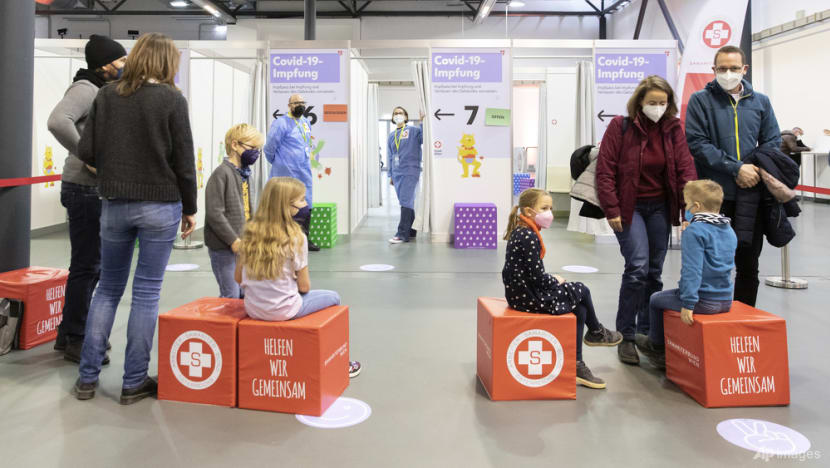
A GLOBAL RECKONING
Political leaders, health ministries and task forces have stumbled through their handling of this pandemic. Lockdowns, home-based learning, work-from-home, vaccination passes, VTL, quarantine and "maskne" (red bumps from wearing a mask for hours on end) are all now part of our vernacular.
Let’s be honest. No one got this right. But I’m not sure anyone could have.
What is certain is this pandemic has revealed the fault lines in each society it touched. Each had inequalities and inadequacies exposed. Poverty, bigotry, income and digital gaps, political instability – every country had to face its darkest and ugliest corners.
The COVID-19 vaccine got caught up in this global reckoning. Instead of heralding the end of the pandemic, it added a unique twist to this tragedy.
It became a battle of ideology instead of immunology. We seemed to not be able to grasp that this was never about personal choice or democracy. It was about public health and civic responsibility.
MORE PEOPLE NEED TO BE VACCINATED
More people need to be vaccinated. Even without the booster, being vaccinated puts us in a better position than being unvaccinated. I know this from my own family’s experience.
With two shots each, my 91-year-old father-in-law and 29 year-old stepdaughter both recovered from COVID-19 at home in Germany. They had cold symptoms and tested negative within a week.

Commentary: Where are the vaccine-hesitant actually getting their ‘research’ from?

Commentary: What can you do if your parents or siblings refuse COVID-19 vaccination?
Lothar Wieler, President of the Robert Koch Institute (RKI), Germany’s national public health institute, said in September that vaccinated people are far more protected. Hospitalisation reports demonstrated this.
In Singapore, the announcement came that the unvaccinated will have to foot their own medical bills from Dec 8 if they become ill from COVID-19.
The concern now is for school-going kids under 12. According to the RKI, children aged 10 to 14 currently form the largest group of COVID-19 cases in Germany, followed by the five to nine age group. RKI recorded 856 outbreaks in schools over the past four weeks.
Part of this is because children are self-testing at schools thrice a week and part of it is the transmissibility of the Delta variant. But mostly it is because kids under 12 are not eligible for COVID-19 vaccination yet.
There is finally some urgency to approve the vaccine for them and to roll it out as soon as possible.
German health minister Jens Spahn expects the EU to approve a child adjusted vaccine for five to 11-year-olds by the end of the week, with 2.4 million doses to be shipped to Germany from Dec 20. Singapore is studying doing the same in January 2022.
What should parents of young children consider in deciding whether to vaccinate them against COVID-19? Find out on Heart of the Matter:
Perhaps instead of schadenfreude, what nations need to do is to learn from each other. Some places are doing some things better. But no one is doing everything perfectly. Not even Singapore. Not even Germany.
Still, for both countries, the way forward is clear. We can have our lives and livelihoods back if more people get the vaccination, even if finding our footing can be challenging when marksmanship is an outcome of trial-and-error.
Both countries may come to an outcome of endemic living through different paths but we all want the same thing. We want to have social lives again. We want to travel again. We want to have weddings and celebrations.
No one wants COVID-19 to rob us of getting on with life.
Lavinia Thanapathy is a Singaporean author and speaker now living in Berlin, Germany.

Commentary: Who knew counting to two and five friends could be so difficult?

Commentary: Can we live with COVID-19 and stop worrying?
Related topics, also worth reading, this browser is no longer supported.
We know it's a hassle to switch browsers but we want your experience with CNA to be fast, secure and the best it can possibly be.
To continue, upgrade to a supported browser or, for the finest experience, download the mobile app.
Upgraded but still having issues? Contact us

Singapore-Germany Travel Bubble: Rules, Regulations & Total Costs of Travelling

Whenever I hear the word “travel bubble”, I can’t help but to get a tiny bit triggered because of the unspoken jinx that befell the Singapore-Hong Kong travel bubble , causing it to close within two weeks after its launch.
That being said, history is unlikely to repeat itself with the Singapore-Germany travel bubble, owing to the advancement of Singapore’s and Germany’s COVID-19 vaccination rate , at 74% and 58% of each country’s population. This travel bubble will allow travellers from both countries to enjoy leisure travel without needing quarantine or stay-home notice (SHN).
If you’re reading this, you’ve probably completed your course of (vaccine, not tequila) shots, and you’re probably bored of taking the same old staycations or daycations . It’s time to relive the thrill of takeoff, the appreciation for different scenery and people!
When will Singapore & Germany’s travel bubble commence?
The Singapore-Germany travel bubble, or Vaccinated Travel Lane (VTL), will start on 8 September 2021 , according to a SafeTravel news release from ICA. This means Singapore citizens and permanent residents (PRs) can just fly to and from Germany without having to quarantine or serve SHN in either country from that date onwards.
Who is allowed to travel between Singapore & Germany’s travel bubble?
Under the VTL, Singapore citizens and PRs will be able to travel unrestricted between both countries. This means that you do not have to quarantine, serve SHN or follow a restricted itinerary.
Germany has been allowing Singapore citizens and PRs unrestricted entry since 25 June 2021 , and now Singapore is simply doing the same.
There are a few caveats though. If you’re not a Singapore citizen or PR but you’ve completed your vaccination course, and you’re travelling to Germany, you will need to apply for a Vaccinated Travel Pass (VTP) . Applications open on 1 September 2021.
What are the requirements to travel between Singapore & Germany?
Here is a summary of what you need to travel to Germany as a Singaporean or PR:
1. Preparing for your trip
Before you fly, you’ll need to be in Singapore for the past 21 days. Not an issue since borders are closed.
Check for travel requirements into Germany here . You are considered vaccinated only if you have one of Germany’s accepted vaccines: only Pfizer, Moderna and AstraZeneca are accepted. More info here .
Do not rely on your TraceTogether app to get you through Germany’s border control! Print or save PDF your vaccine certificate from National Immunisation Registry or HealthHub App.
Your COVID-19 vaccine certificate should include the following details:
- Particulars of the person vaccinated
- Date & number of vaccinations
- Name of vaccine used
- Seal of authentication
2. Booking your flights
You will need to book a designated VTL flight from Singapore Airlines or Lufthansa .
Your flight to Germany can be any direct flight. If you book a transit flight, then you will void the 21 consecutive days in Singapore or Germany requirement.
Your return flight to Singapore needs to be a designated VTL flight with the following flight numbers:
- Singapore Airlines: SQ325 or SQ 331
- Lufthansa: LH778
At time of writing, return trips start from $970 . This price might spike up due to ravenous demand!
3. Pre-departure testing & check-in
During flight check-in, you’ll need to have these ready:
- Negative PCR test result OR
- Vaccine certificate
4. Arrival & travelling in Germany
To qualify for VTL travel, you’ll need to spend at least 21 days in either Singapore or Germany. So if you are only travelling to Germany, your trip does not need to be 21 days long.
But if you travel or transit to other countries outside of Germany, then you will need to spend 21 consecutive days in Germany before departing for Singapore.
While travelling in Germany, you’ll need to adhere to German health authority mandates .
5. Flight back to Singapore
You’re only allowed fly back to Singapore on the following VTL flights:
- Singapore Airlines: SQ325 or SQ331
Before you return, you need to take a PCR test in Germany before flying back to Singapore. Again, self-test kits are not allowed.
Expect to pay up to $200 for PCR tests in Germany. See the list of accredited German clinics here and here .
Also, once you land in Singapore, you have to take another PCR test. Book and pay for on-arrival PCR test before your flight back to Singapore.
6. Arrival & staying in Singapore
Upon reaching Changi Airport, you will be prompted to do your on-arrival PCR test along with immigration and customs. You need to self-isolate whilst waiting for your on-arrival PCR test results.
After clearing this PCR test, you’ll have to take another two tests on Day 3 and Day 7 in Singapore. Wait for an email containing your unique hyperlink to book your Day 3 and Day 7 PCR test appointment at designated clinics.
You can have two different designated clinics for your Day 3 and Day 7 PCR tests, and do not need to self-isolate whilst waiting for the Day 3 and Day 7 test results.
In total, you will need to take 5 PCR tests: 1 before you depart Singapore (~$160), 1 before you depart Germany (~$200), and 3 more (~$160, ~$95 and ~95) after coming back to Singapore. Including an admin fee of about $5, that’s about $715 on PCR tests alone .
How much should you budget for your Germany trip?
As you can glean from above, there are a lot of administrative costs that go into travelling to Germany via the VTL.
Here’s an estimated and summarised table of costs for a 3-week trip to Germany:
The above-mentioned are estimated costs for a solo traveller looking to make a 3-week trip around Germany. Do note that these costs vary from traveller to traveller, especially with regards to fluctuations in flight prices, the type of accommodation and food that you’re comfortable with, and also transport prices.
Flight costs to Germany ($970++)
Flight prices are especially susceptible to fluctuations, it might be $970 today… but tomorrow, it could be $1,070 due to ravenous demand! In this regard, flight prices are much like house prices , it’s always cheaper to buy today.
Accommodation costs in Germany ($100+/- a night, $2,100 total)
Accommodation is where you can save or spend a lot more, depending on the type of traveller you are. You can cut that budget down to ½ or ¼ of that amount if you’re a shoestring hostel-hopper like me.
Prepare to spend at least double that amount if glammed-up staycations / daycations are your thing.
Food costs in Germany ($50+/- a day, $1,050 total)
This is also another area where you can save or spend a lot more.
If you opt for supermarket meals or decide to cook in your accommodation, you can comfortably cut the budget in half.
If restaurant meals are your thing, be prepared to drop at least $35 per person, per meal. At least tipping isn’t a thing in Germany.
Transport costs in Germany ($50+/- a day, $1,050 total)
If you can help it, abuse Germany’s well-appointed public transportation network. Opt to use the high-speed rails or bus network when travelling interstate, and get out and about the city by walking! Find more information about the German public transport tickets here .
PCR tests (4 tests, $554.09 total)
This is the main bulk of the cost that’s going to put off many prospective travellers including myself — whereas Germany only requires 1 PCR test (if you don’t have your vaccine already), Singapore, in true sinkie spirit, requires 4 PCR tests. FOUR.
FOUR WHAT???
That means getting your nose and tongue swabbed with the same cotton bud potentially up to 5 TIMES just to be able to travel, and 4 of which is imposed by the home nation! Talk about being kiasu !
Anyway, it bears repeating that self-test kits are not allowed, and the German clinics that are recognised by Singapore’s authorities can be seen here and here .
What if I get COVID-19 while travelling in Germany?
Tough luck! You’ll have to foot the medical bill yourself (mostly). This is why it’s especially important to get travel insurance that covers against COVID-19, and FWD is one of the few providers that provide such coverage .
Aside from that, you can tap into existing government subsidies, and make health insurance (MediSave, MediShield Life, Integrated Shield plans or private health insurance) claims for your treatment of COVID-19 in Singapore. This is only applicable if you’re a Singapore citizen, PR, or a long-term pass holder, and only if your symptoms appear within 14 days of your return.
Where else can Singaporeans travel to?
The only other country that Singapore has a VTL arrangement with is Brunei Darussalam. Existing reciprocal green lanes (RGLs) have been suspended.
All other countries will be subjected to varying levels of SHNs as outlined by this SafeTravel document .
Should Singaporeans make travel plans to Germany?
If you have the money and have gotten all your ducks in a row (i.e. getting travel insurance that covers against COVID-19 and making all the necessary arrangements following up to the travel date), absolutely! Who knows if/when the VTL will close again.
If you’re risk-averse, and the idea of travelling to Germany isn’t really appealing to you, then you should not travel and wait till the global COVID-19 situation is better. “Better” is a relative term, because the promises made by governments worldwide and their attempts at controlling the spread of COVID-19 (looking at you, Malaysia) remains to be seen.
That being said, whether you are travelling or not, it’s important to be covered against COVID-19. Take a look at the articles detailing health insurance in Singapore and decide which coverage suits you best!
Know anyone with a clipped wing complex? Share this article with them!
- Entering, Transiting and Departing

- General Entry Requirements
- Visa Requirements
- Submit SG Arrival Card
- What you can bring
- Transfer of Remains for Cremation / Burial to Singapore
- Public Health Requirements
- Yellow Fever Vaccination Certificate
- Clearance Procedure for Travellers
- Clearance Procedure for Sea Crew / Pleasure Craft owners
- Cargo and Postal Article Requirements
- Taking Cash In and Out of Singapore
- Woodlands and Tuas Checkpoints Traffic Updates
- Three-Quarter Tank Rules for Departing Vehicles
- Driving In and Out of Singapore
- Use of QR Code for Immigration Clearance at Woodlands and Tuas Checkpoints
- Retrieve e-Pass Record
- Check the End of Your Stay
- Advice for Singapore Citizens Travelling Abroad/Returning to Singapore
- Child Born Overseas
- APEC Business Travel Card
- Apply for Overseas Automated Clearance
- Renunciation of Singapore Citizenship
- Check Re-Entry Permit Validity
- Renunciation of Permanent Residence
- Check if You Need an Entry Visa
- Seek Extension of Visit Pass
- Report Loss of Foreign Passport
- Delivering a Child in Singapore
- Tourist Refund Scheme
- Automated Clearance Initiative
We've detected unusual activity from your computer network
To continue, please click the box below to let us know you're not a robot.
Why did this happen?
Please make sure your browser supports JavaScript and cookies and that you are not blocking them from loading. For more information you can review our Terms of Service and Cookie Policy .
For inquiries related to this message please contact our support team and provide the reference ID below.

IMAGES
VIDEO
COMMENTS
German Embassy in Singapore - Information on entry into Germany, and quarantine regulations
Travelers who have spent time in Singapore within 10 days prior to entering the Federal Republic of Germany will have to be. a) fully vaccinated or. b) need to demonstrate an important reason for entering Germany. More information on entering Germany from Singapore can be found in the FAQs of the Federal Ministry of the Interior in German and ...
SINGAPORE - Fully vaccinated Singapore residents can travel to Germany and back without having to serve stay-home notice (SHN) from Sept 8.
This article contains information on entry to Germany for persons who are fully vaccinated with approved vaccines. Persons who are fully vaccinated against the coronavirus SARS‑CoV‑2 with vaccines approved by the European Medicines Agency (EMA) (or equivalents of these vaccines used in third countries) can enter Germany from Singapore.
Singapore residents will soon be able to enjoy quarantine-free travel to and from Germany under the new Vaccinated Travel Lane (VTL) arrangement that commences from 8 September 2021. This marks the first time in almost 18 months that Singaporeans have been able to travel to and from an overseas country with no quarantine on either side.
As Singapore moves into 'endemic COVID' phase, with around 80% full vaccination among its 5.7 million resident population, a gradual relaxation of border restrictions is finally starting to take effect, leading to the announcement of the first Vaccinated Travel Lanes (VTLs).
SINGAPORE: Travel agencies expect to receive more enquiries for travel to Germany and some are planning to offer new packages, following the announcement of the quarantine-free vaccinated travel lane.
On the same day I wrote about how Singapore's rumoured pilot programmes for business and leisure travellers were a step in the wrong direction, they've gone and announced something very different. From 8 September 2021, fully vaccinated Singapore residents will be able to travel to and from Germany and Brunei with no quarantine requirement ...
Find continuously updated travel restrictions for Germany such as border, vaccination, COVID-19 testing, and quarantine requirements.
The first Singapore Airlines flight under a new Vaccinated Travel Lane arrangement will take off from Frankfurt in Germany to Singapore on Sept 7, 2021.
SINGAPORE - Singapore's plan to pilot leisure travel for those vaccinated against Covid-19 - starting with Germany - has given cheer to travel-starved residents who have been kept at home by the ...
The Singapore-Germany travel bubble, or Vaccinated Travel Lane (VTL), will start on 8 September 2021, according to a SafeTravel news release from ICA. This means Singapore citizens and permanent residents (PRs) can just fly to and from Germany without having to quarantine or serve SHN in either country from that date onwards.
SINGAPORE: Singapore will be launching quarantine-free travel lanes for vaccinated passengers from Germany and Brunei Darussalam next month, as it further moves to reopen its borders. Under the ...
However, you can only return to Singapore on a Vaccinated Travel Lane flight if you have spent 21 consecutive days in Germany before returning. Schengen and non-Schengen transit restrictions apply.
SINGAPORE: Germany will classify Singapore as a "high-risk area" from Sunday (Oct 24), the country's embassy in Singapore announced. Those who are fully vaccinated against COVID-19 can still ...
Citizens of Germany can now travel to Singapore without being required to follow quarantine rules provided they are fully vaccinated. However, they must test negative to four COVID-19 tests. Besides Germany, Singapore has reopened its borders to more vaccinated travellers from other territories such as Hong Kong Kong, Brunei and Macao ...
The Ordinance on Coronavirus Entry Regulations ( CoronaEinreiseV) expires on 7 April 2023. After that date, entry into Germany will again be possible without coronavirus-related entry restrictions while observing the general entry requirements under the law of residence and relating to the border police (information from the Federal Ministry of the Interior "Lifting of COVID-19-related ...
BERLIN, 25 October 2021: German authorities have tightened entry restrictions for travellers from five more countries, and despite enjoying special vaccinated travel lane status, Singapore is on the list. Based on Robert Koch Institute input, Germany added Bulgaria, Cameroon, Croatia, Congo and Singapore to an update of high-risk countries and regions. RKI is the government […]
Some travelers from Hong Kong, Macao, Germany and Brunei will soon be able to enter Singapore without having to serve quarantine. Authorities announced the lifting of border restrictions for ...
In response to the global COVID-19 pandemic, many countries, including Singapore, have implemented travel restrictions to control the spread of the virus. If you are planning to travel from Germany to Singapore, it is important to be aware of the current travel restrictions in place.
Enroll in the Smart Traveler Enrollment Program (STEP) to receive security messages and make it easier to locate you in an emergency. Call us in Washington, D.C. at 1-888-407-4747 (toll-free in the United States and Canada) or 1-202-501-4444 (from all other countries) from 8:00 a.m. to 8:00 p.m., Eastern Standard Time, Monday through Friday ...
Conventions, meetings and tourism revived in Germany as Singapore struggled with a puzzling rise in COVID-19 numbers and even more restrictions.
The Singapore-Germany travel bubble, or Vaccinated Travel Lane (VTL), will start on 8 September 2021, according to a SafeTravel news release from ICA. This means Singapore citizens and permanent residents (PRs) can just fly to and from Germany without having to quarantine or serve SHN in either country from that date onwards.
Entering, Transiting and Departing. Reside, Study and Work in Singapore. e-Services and Forms. Check Status / Make Appointment. Travellers will need to take note of border requirements or restrictions that are in place. Please click the buttons below for more details on entering, transiting or departing Singapore.
Singapore Airlines Ltd. has introduced tighter cabin restrictions for when aircraft hit turbulence after one passenger died and scores were injured on a flight from London earlier this week.